Photo: OURS Co.
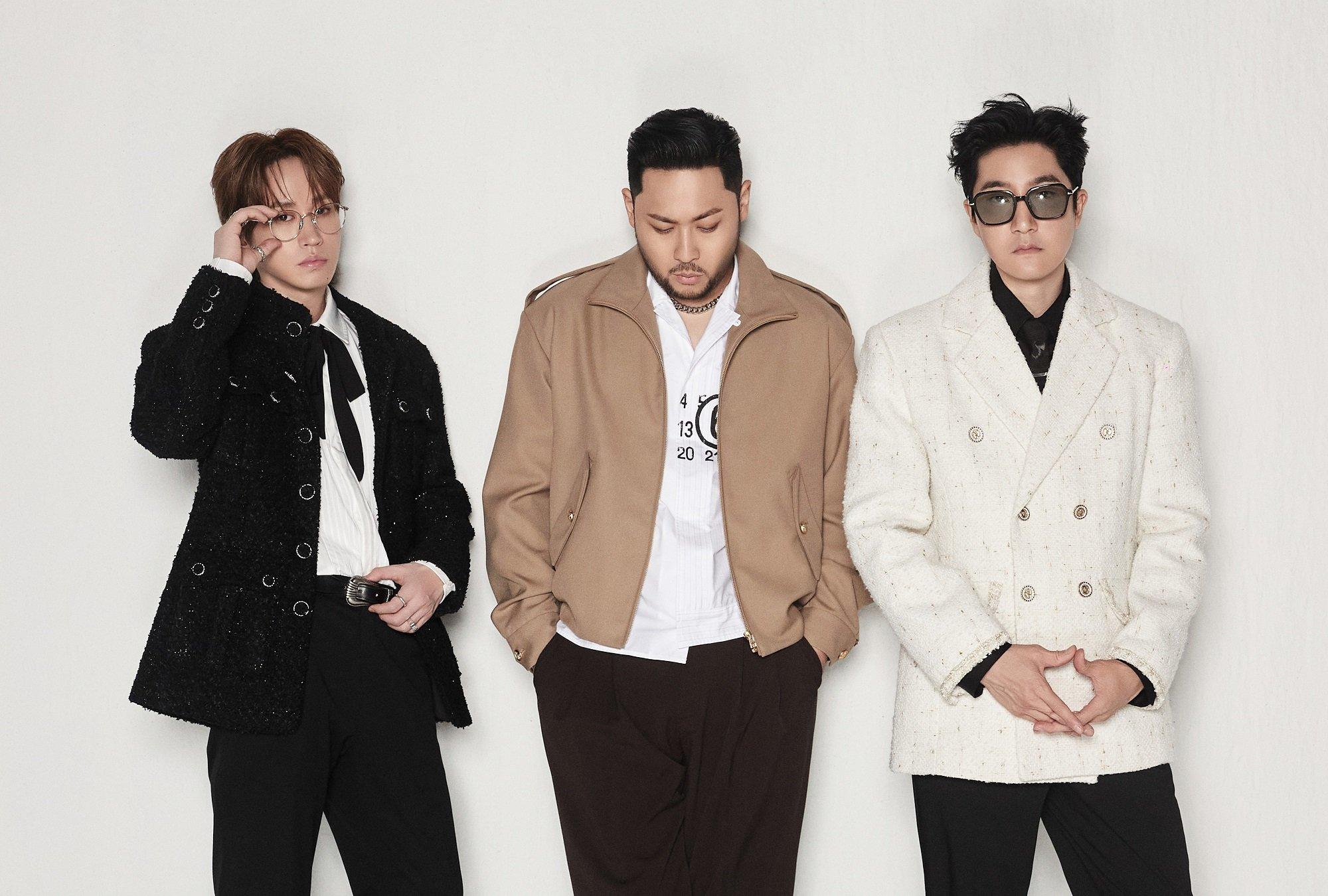
interview
Epik High Are Still Pumped After All These Years: How The Korean Hip-Hop Trio Broke All Their Rules By Going Back To Basics
Epik High have released their first mixtape, 'Pump,' 20 years into their career. Frontman Tablo details their new release, U.S. tour, and why he wants to be onstage in his grandpa years.
When Korean hip-hop trio Epik High released their debut album, Map of the Human Soul, in 2003, the world seemed completely different.
"Can you believe we didn’t have smartphones? I can’t imagine, I can barely remember," says Epik High frontman Tablo over a video call from Seoul.
Yet, those are the years the group aimed to recall in their first mixtape, Pump. Musing on their beginnings, the trio — also composed by Mithra Jin and DJ Tukutz — breaks free from their usual formulas in favor of fluid and raw tracks, as can be seen in the single "Antihero."
"We wanted to create like we were rookies again," Tablo says. "We didn't want to think about the path too much, although we did make references to certain songs from early albums because it's fun."
Released in June, Pump is a testament to Epik High’s ability to reinvent themselves. Over 10 studio albums, four EPs, and a handful of special releases , they remained a pivotal group in South Korean music. Through chart-topping hits like "Fan," "Fly," "It’s Cold" with Lee Hi, and "Born Hater" featuring rappers Beenzino, Verbal Jint, B.I, Mino, and Bobby, they helped popularize hip hop and rap in a country dismissive to those genres. Their insightful and honest lyrics encouraged larger discussions about mental health and social issues, inspiring artists such as BTS and B.I. And Their message and music led to global acclaim as well: In 2016, Epik High became the first major South Korean act to perform at Coachella; they would perform again in 2022.
To celebrate another year of growing success, the band recently embarked on a world tour. After crossing Asia and Australia, they kicked off the first out of 23 shows in North America on Aug. 22, in Vancouver, British Columbia, and are set to play in Los Angeles, Houston, Chicago, Orlando, Boston, and other U.S. cities throughout September.
Ahead of the tour, GRAMMY.com caught up with Tablo to chronicle this distinct moment in their careers, how to maintain longevity as a band, and living a life worthy of a K-drama.
This interview has been edited and condensed.
Epik High just released their first mixtape. In previous interviews, you've defined 'Pump' as a mixtape because, sonically, it’s very different from your studio albums and EPs. Why are you exploring this format 20 years into your career?
We felt kind of lost as we were leading up to our 20th year, which is ironic. On the surface, it looked like we had it all together, because we were doing our 20th tour and we had a movie [showcasing the group's 20th anniversary concert] out, but it's a scary number. It was scary when we hit 10, but hitting 20 — when a human hits 20, they're like, I'm an adult. Now, what do I do with my life?
Epik High turned 20, and we [started wondering], What would we do if we were back to our first year and no one knew us? If we didn't know how to make music the way we know now? What kind of album would we create? We [thought], A mixtape, just free flowing and doing whatever we want, and breaking all the rules. Not music rules, but Epik High rules, because we've developed some of them over the years.
What are some of these rules?
Well, it's not necessarily rules. What I said to my members was, "I think our biggest weakness is that we know too much." Over the years, we've gained so much experience and our skill level has gone up to the point where we know exactly how to craft a hit, and we know exactly what kind of songs will speak to what kind of audience. Knowing all of this typically would be a good thing, but for us, it's our disadvantage — because we will immediately go to those decisions, instead of exploring something new or risky.
It took [the members] a while to accept that. I had to drag it in, and then they came to me, "You know, you're right. We do feel like that." And I was like, "Let's write these things down that we don't want to do." All of them were things that we usually do, like, let's not just go to a famous feature, because that's such an easy thing that we know how to do. Let's not make big melody hooks that we know will work. And then we just went with that, which in itself is very risky, because we didn't know how the audience would react.
Judging by our streaming, usually hit songs spike like crazy in the first couple days, and then fall off because a lot of people only listen once or twice. And then there are songs where less people listen because it's not commercial or it's not catered to everyone, but they listen over and over again, and that's what we're seeing with this album. It’s a very interesting phenomenon, and something that actually makes us very happy.
I noticed that 'Pump' is quite different from the music that you have been doing lately. You need to spend some time with it to understand what's going on and to find its magic. It's not an album of easy hooks, like you said. Do you think you guys were revisiting the Epik High of 20 years ago, or that you were rewriting that era, doing what you wish you had done?
There's both. We wanted to create like we were rookies again; we didn't want to think about the path too much, although we did make references to certain songs from early albums because it's fun.
But we don't ever regret things, or wish we could go back to a certain era, because there was a lot of good stuff, but there were also a lot of terrible things that we don't want to ever revisit. So, we're more focused from today on.
Thinking back to 20 years ago, what are some of the changes you witnessed, either in music or in yourselves?
Literally, the entire world has changed. When we started, people were still dropping cassette tapes. Now, cassette tapes are something fun that artists do as a collector's item. We didn't have streaming. We didn't have social media. I'm sure some people who are reading this interview can't even fathom, but we did live in a world without any of that.
The downside is that it was very, very difficult to get our music to audiences. To get one listener was almost an impossibility, so we were forced to go out and perform. Back then, hip-hop was not accepted at all [in Korea]; it was just not a genre that people liked. And because we didn't have any stages to go on, we performed at a zoo, we performed at clubs with 13 people in there, we just had to do that because that was the only way to get our music out.
And the huge upside, though, is that, because we developed our skills performing to an audience that was either confused by us or didn't like us, we had to make them understand the music and make them vibe. We developed a very specific skill set that is really hard to attain. I think that's why, 20 years later, we're still able to headline festivals and to do these big tours, and people have a really good time at our shows.
Nowadays, a lot of times musicians will feel satisfied with their streaming numbers, or with their social numbers. They might not feel that it's necessary to get out there and to perform in front of 10 people. I'm sure none of them will perform at a zoo.
This mixtape’s single, "Antihero," approaches people’s perceptions and misconceptions about Epik High. When someone gets famous, they are either idolized or demonized — we see that a lot in the Korean music scene, specifically in K-pop, where fans even call artists "idols." What do you think about that? Is this related to the message you wanted to convey?
"Antihero" is less "I'm an antihero," and more "You see me as an antihero," where you may like me, but you don't fully like me. There's always some flaw, or some weakness that you're looking for, and that's sort of the stance of the song.
Epik High has had a lot of anti[fans] over the last 20 years, and at the same time, though, we provide a lot of entertainment to these antis. They would literally have nothing to do if we didn't provide them with something to get angry about, or to harass us about. In a way, we're sort of these twisted heroes to them as well.
That's why, if you look at the music video, [there is] a hero part, and then a villain part, because those are the two sides of an antihero. But that's also the two sides of any star, or any person, actually. Some people choose to see the good parts of you, but some people will choose to ignore all of that and see just the parts that seem dark. I think that the song is touching on all of that.
The lyrics to "K-drama" use Korean TV dramas' vocabulary — like "dramatic reversal" and "OST" — to talk about real life. What do you think about the image that South Korea displays in these shows?
I'm a huge fan of K-dramas. It's just very fun, and always has you at the edge of your seat. I don't know if people outside [of Korea] think that, if you come to Korea, you're immediately stepping into a K-drama. A lot of people get deluded and think, like, all Korean men are perfect.
But just the same, a lot of people outside the U.S. think that, if you go to L.A., it's going to be like a Dr. Dre music video, or a Snoop Dogg music video. And that's just one depiction of one part of a very complicated, beautiful, and complex place.
There's always truth in fiction, so you will discover elements of K-dramas when you come here. But if life was a K-drama… A lot of K-dramas are really tragic, the plot twists. Although I will say, I've been embroiled in the TaJinYo scandal [Editor's note: Starting in 2010, Tablo was victim to a smear campaign that accused him of faking his bachelor's and master's degrees from Stanford University. The school came forward multiple times to confirm his accomplishments, and eight TaJinYo members were sentenced to prison.], and there were actual directors, even overseas, who wanted to turn it into a drama or a movie. So, I guess I did live a life that's like a K-drama, true with heroes, villains, and victims. It was crazy.
Why hasn't it become a series or a movie yet? Do you plan on making something like that?
Well, it's a very tricky story to tell. It's a timeless story, because it's about the internet, and it's about hatred and idolization, but it's not an easy thing to turn into a fictional story.
Do you feel like it would be weird to see your life depicted on screen? Or do you already feel that, since a good part of your life has been public?
I am very good at keeping myself and my family detached from our public persona. But I don't mean to say that Tablo or Epik High are not an actual version of ourselves. It's just that Epik High is different in that, when we come off stage, we don't experience that huge drop off.
On stage we have a very specific goal, which is to make the audience have a great time. Nothing else is on our minds. And because of that, when we come off stage, there's no high to come off. We finish the concert and we're home 20 minutes later, doing dishes and vacuuming. I’m not kidding. Epik High is notorious for not having after parties, and we will just come home after a huge stadium concert and watch YouTube with our kids, or take out the garbage.
It keeps your ego in check.
Yeah. When we first became famous, we probably did have a period where we thought, This is about us. But very quickly we realized that, if this was about us, we were not going to have longevity, because that fades. But if you keep it about the audience, as long as they're there, you know that it won't change.
Since you talked about longevity, what are the most important things for a band to stay together and to still be relevant and innovative after 20 years?
Over the last couple of years, a lot of huge brands in Korea have invited me to speak to their companies. I think they look at us as a case study on the longevity of a brand, or how to stay connected for a long time. And I've declined, because speaking is not something I wanted to do, but it made me think, What is it?
First of all, you have to have no "yes men" around you.This is a very simple, but also extremely difficult thing to do, because people need an affirming environment, and that's not a bad thing, right? It's a very thin line between a supportive person, and a person who just tells you what you want to hear.
Epik High has absolutely zero of those people in our rooms. In interviews and stuff, the three of us almost seem like we hate each other. We're never not fighting, and we're doing it on screen, so imagine what we're like off screen.
Also, our staff [is] a very dedicated group of people, and we're all very, very honest — from our engineer to our art guy. Most of the people that we work with have been working with us for a long time, and none of them are scared to tell me, "Tablo, that outfit ain't it. Your hair ain't it." Or, "Tablo, your voice sucks right now." Or, "these lyrics are terrible." We're all very honest, and I think that's key to longevity.
An artist's career is sometimes destroyed by outside forces. But I tend to believe that, in a lot of cases, artists' careers get destroyed by the artists themselves. It's not their fault, but when you're constantly told what you want to hear, instead of what you need to hear, it's impossible to grow. If the people around you actually care for you, they will never prevent you from experiencing things, which is necessary for growth.
Looking ahead to the next 20 years, is there anything you want to do that you haven’t done yet?
We actually had this conversation lately: Wouldn’t it be really cool if there was a Korean hip-hop group who stayed together until they were grandpas? And we’re on stage with gray hair, but we’re still super good. And people will see us on TV or so, and will be like, "Those grandpas are dope!"
A lot of young artists tell us that they started music because they listened to Epik High. But later on, after they become big stars, they tell us that now we inspire them because we show that it’s possible to do [this] for over 10 years, 20 years, and still do what you want to do.
We never had that. We didn’t have anyone to look up to, any [groups] who stayed together and [kept making] music at the same level that they always did, so we were really scared. Hopefully, us becoming dope grandpas in the future will show people that it’s okay. It’s okay to just keep doing it.
More K-Pop News
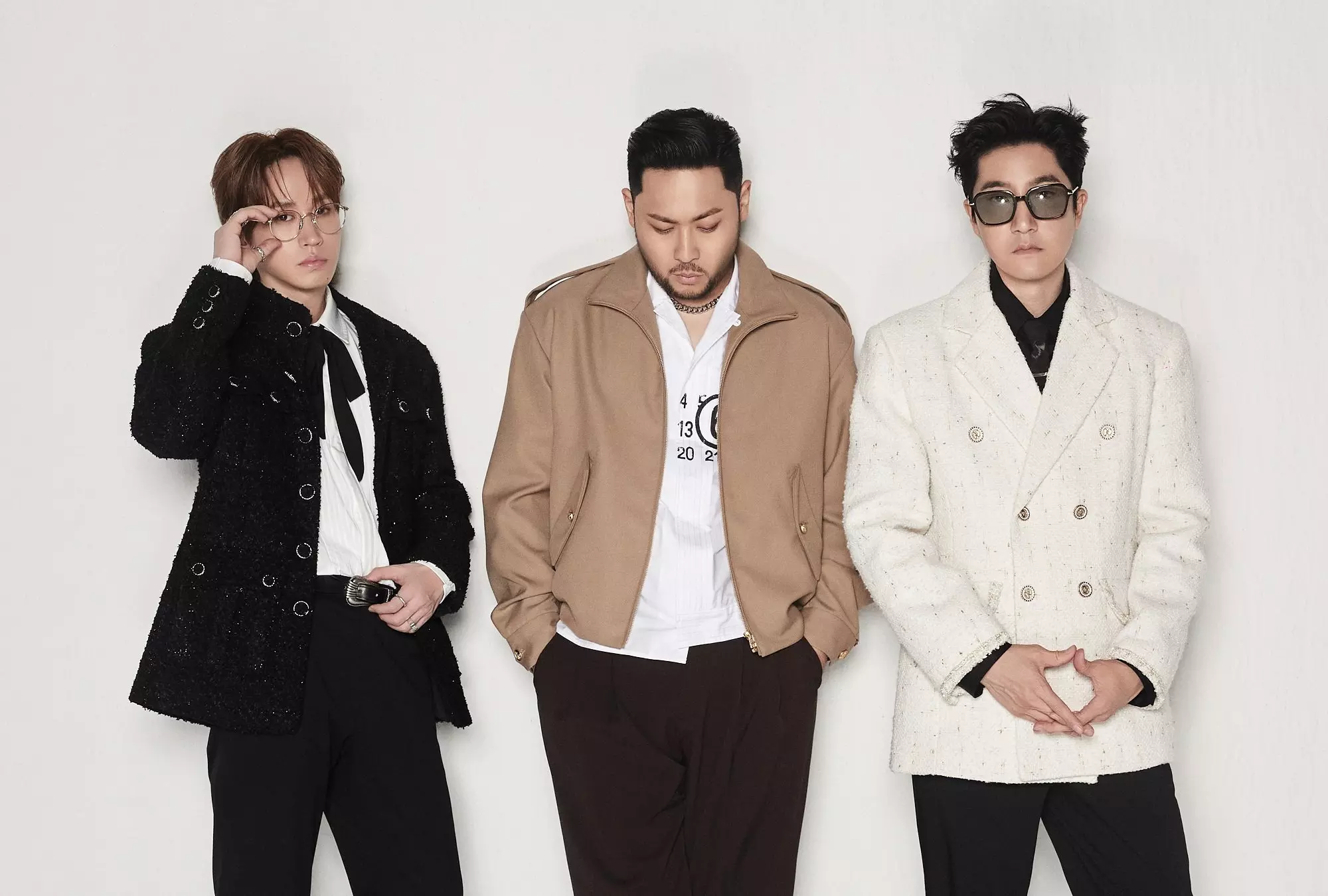
Epik High Are Still Pumped After All These Years: How The Korean Hip-Hop Trio Broke All Their Rules By Going Back To Basics
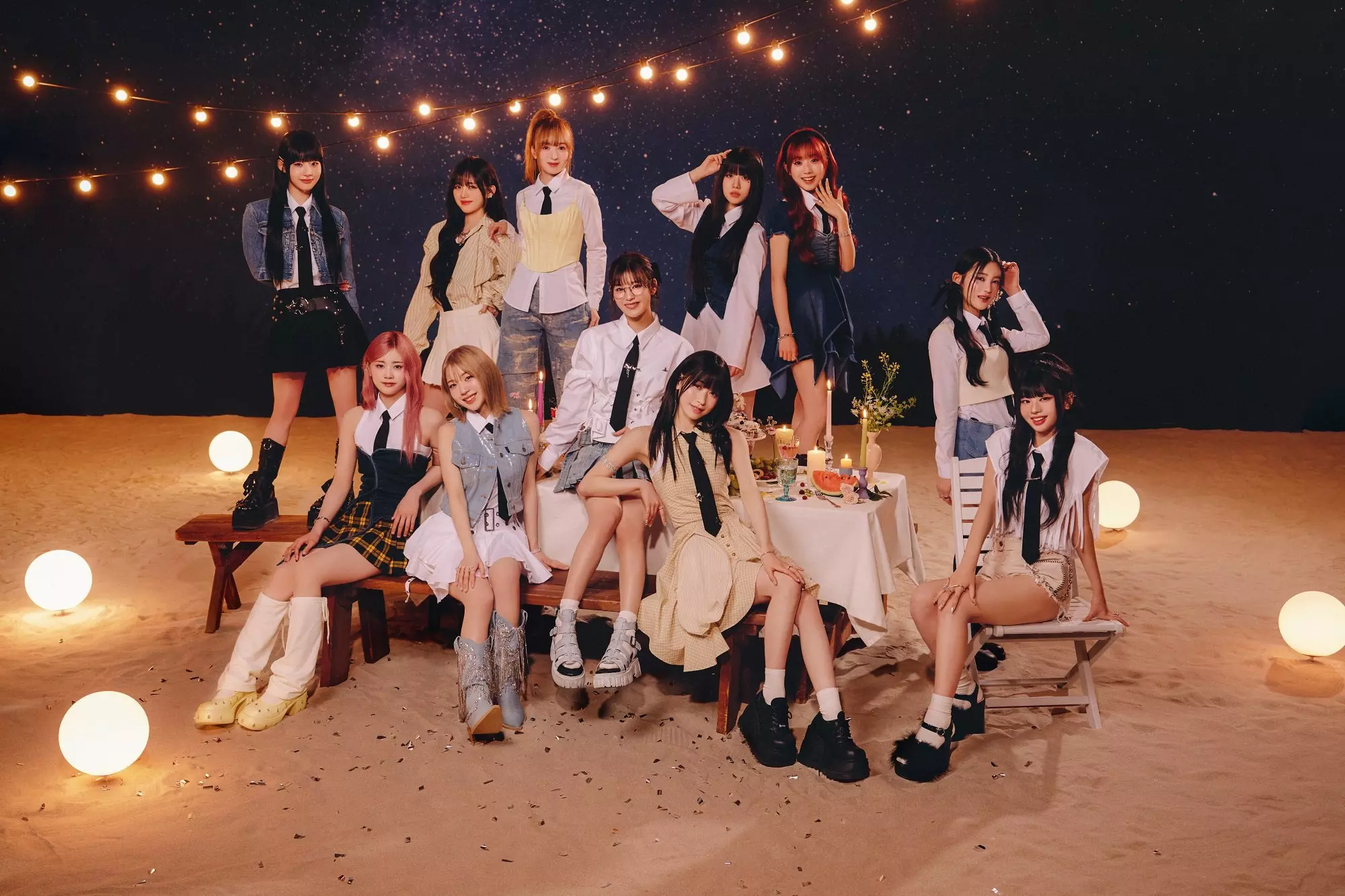
Meet ME:I, The J-Pop Group Who Want To Give The World A 'Hi-Five'
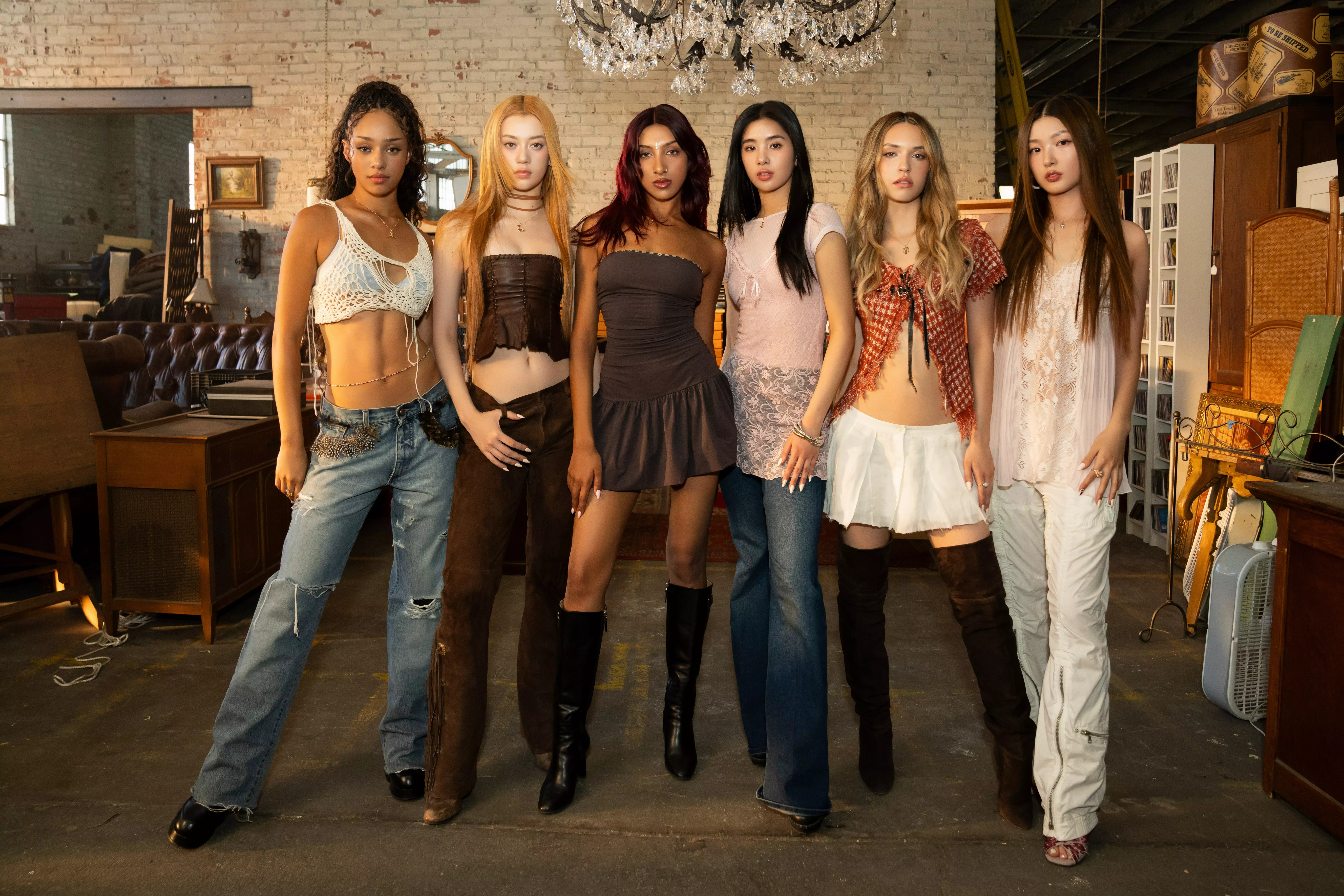
Get To Know KATSEYE: The Global Girl Group Styled After K-Pop Superstars
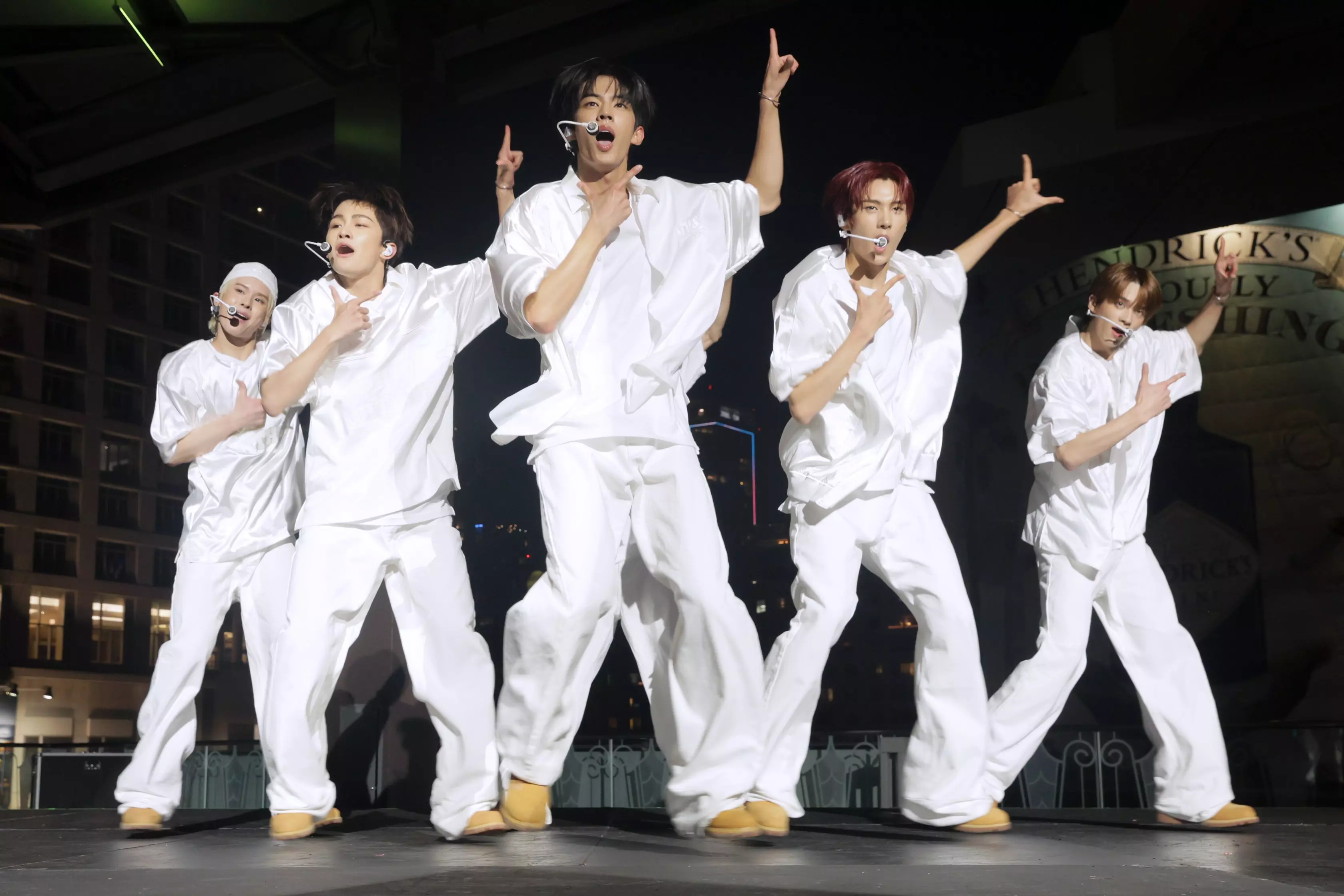
5 Takeaways From The GRAMMY Museum’s "HYBE: We Believe In Music" Exhibit
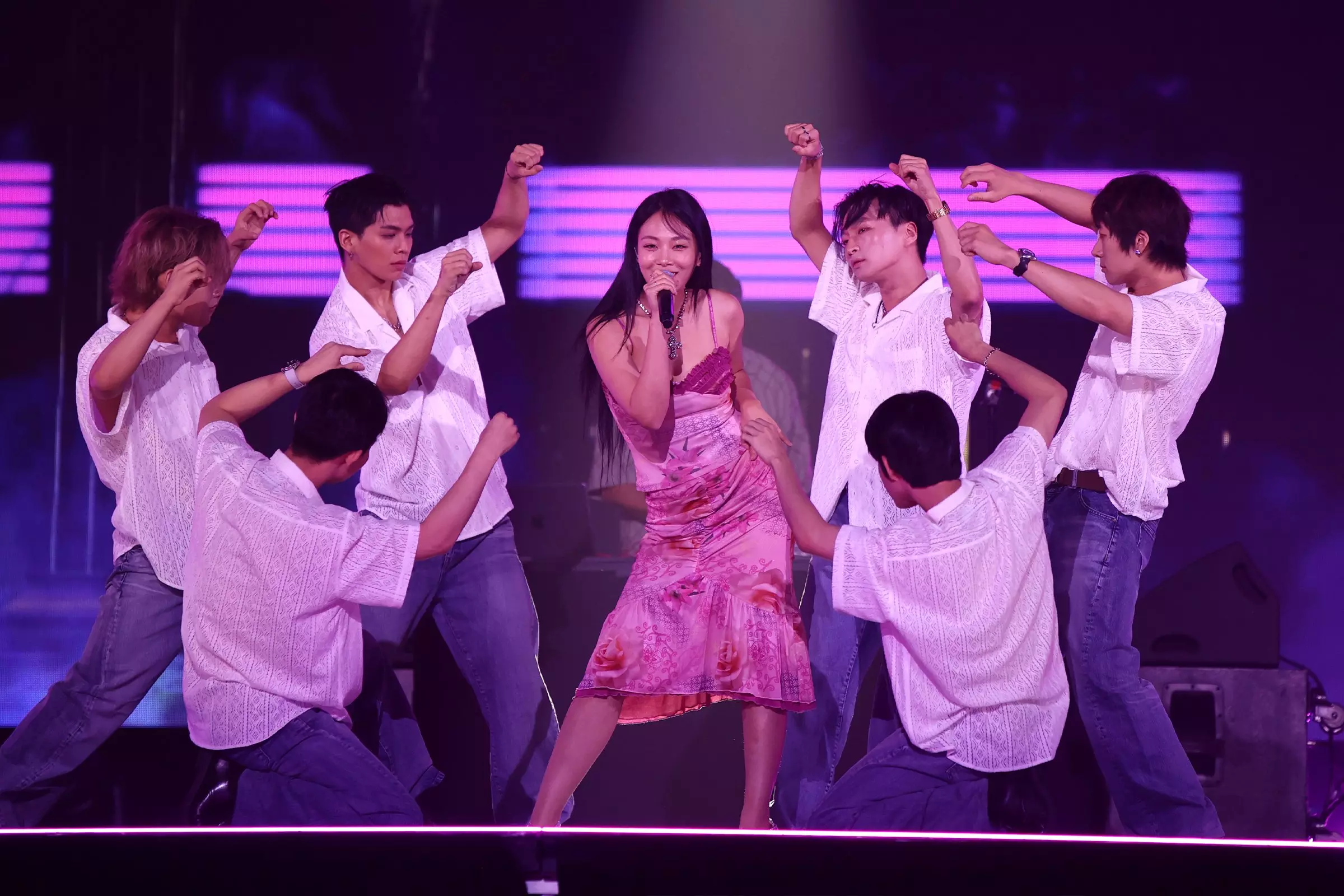
KCON L.A. 2024: 7 Highlights From NCT 127, ZEROBASEONE, NMIXX & More
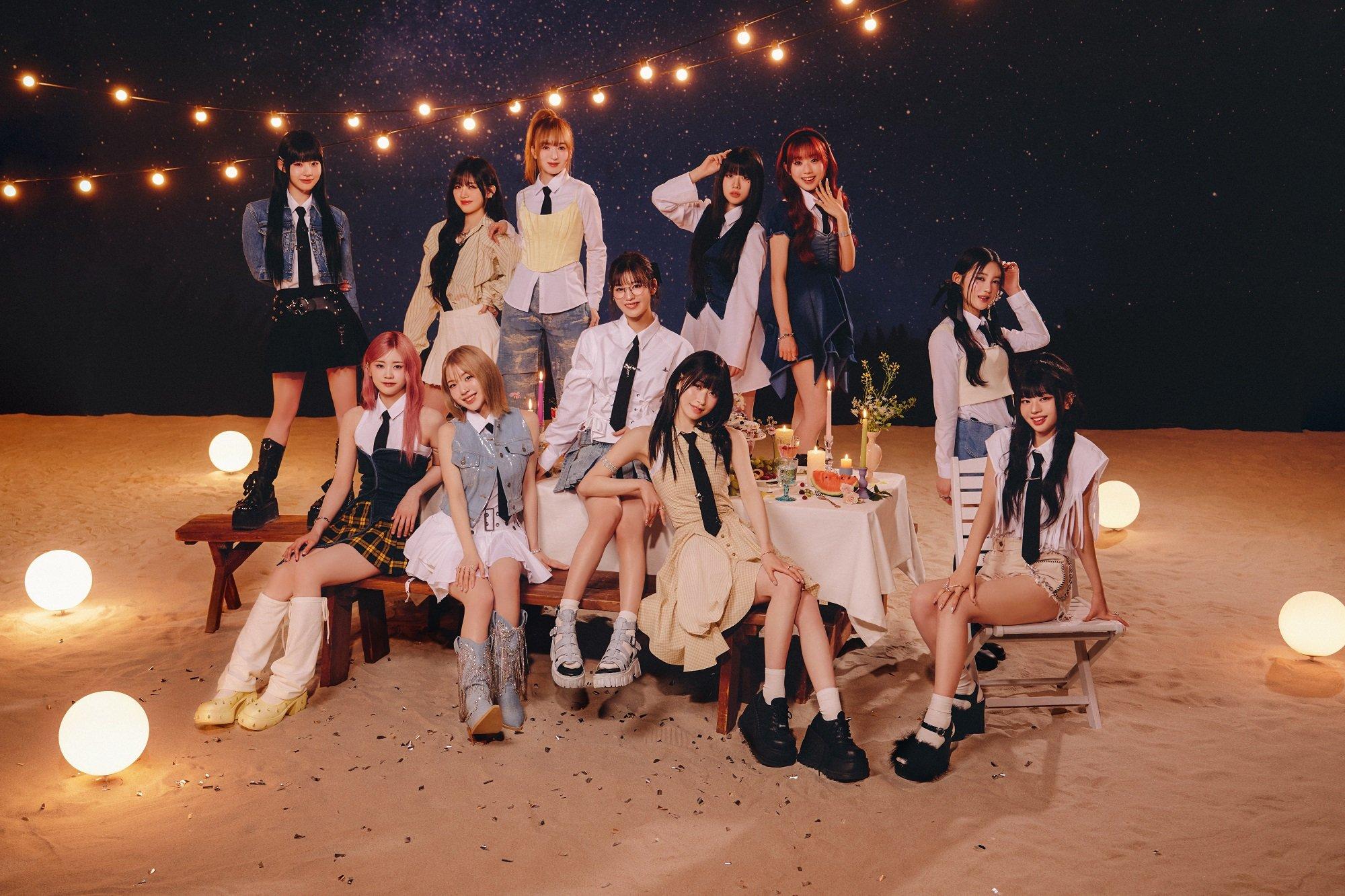
Photo courtesy of LAPONE GIRLS
interview
Meet ME:I, The J-Pop Group Who Want To Give The World A 'Hi-Five'
Ahead of their sophomore EP, 'Hi-Five,' members of ME:I discuss their new release, origin story and what's next for their collective colors.
When J-pop group ME:I debuted their balmy anthem "Hi-Five" at KCON L.A. 2024, their contagious energy captivated a stadium of fans and soon-to-be devotees. The song's euphoric vocal climax electrified the audience, asserting that "it's going to be a special season."
The 11-member group harnessed the spark of "Hi-Five" as they segued into "Click," the lead single off their debut EP, MIRAI. The magic of Momona, Rinon, Cocoro, Ran, Miu, Kokona, Shizuku, Ayane, Suzu, Keiko, and Tsuzumi (who is currently on a health-related hiatus) placed the audience at the Crypto.com Arena under a spell — their stage presence characterized by a vivid intensity and an endless allure.
But arriving at this moment involved traversing an arduous path. Before their debut, the 11 members appeared on the third season of "Produce 101 Japan" — the same survival show that previously brought boy groups JO1 and INI to life — and a global audience watched the trainees attempt to break into the music industry.
After overcoming the show's tests and hurdles, ME:I was born at the tail end of 2023, and MIRAI was unveiled in April. The record achieved remarkable success, reaching heights on the Billboard Japan and Oricon Charts with over 250,000 copies sold to date. Crucially, MIRAI showcased the group's artistic core, with music infused with a radiant temperament and complemented by intricate choreography.
Now, ME:I are building on that growth with their sophomore extended play, Hi-Five, out on Aug. 28. "This second [release] sounds much fresher, and since it's a summer concept, it feels very joyous," Cocoro tells GRAMMY.com over a video call from Tokyo. "It's definitely a step forward because…We are like a chameleon and can shift in different colors and forms as a group, so with Hi-Five, I think we've been able to expand our [artistry]."
ME:I are disarmingly genuine about their collective desire to keep growing while remaining down to earth about their success. "I want us to be role models and be a group where people can look at us and say, Okay, I want to do that one day and give them dreams," says Suzu.
Ahead of their EP release, ME:I detailed their journey so far, their experience at KCON, and how they're adjusting to their present while getting ready for tomorrow.
This interview has been edited and condensed.
How much does your present self differ from the artist you aspired to be before debuting? Perhaps your view of what it meant to be an idol has evolved since then, especially in light of your experiences during "Produce 101 Japan The Girls."
Cocoro: When I was in the audition process, I only had a vague idea of what kind of idol I wanted to be. However, when we formed ME:I and it [became a reality] that we were going to debut, that's when I realized there was a lot of attention and interest in our group — more than I expected. I felt that we were receiving love from not only people in Japan but also from around the world. Especially among the young people.
Momona: During my time at ["Produce 101 Japan The Girls"], I was able to meet a lot of people, I discovered new music, and I performed on different stages. I found that [those experiences were] quite different from what I originally imagined myself to become, and there wasn't any clear goal of what this team would be or a defined concept, so I was just focusing on whatever was in front of me during that process.
Our debut song, "Click," was something we didn't expect. It was a challenge for us because it was different from your typical K-pop, J-pop, or the "girl crush" movement that's happening right now. That song signifies that we are challengers and are here to bring a fresh breath of air into the industry. We are focusing on achieving the same or even more success with our new release.
Looking back, is there anything you would have done differently during "Produce 101 Japan The Girls"?
Miu: When we were in the middle of [the competition], we were in a very closed environment, rehearsing and trying to perform in teams. But, it was very difficult to find individual growth. I was only able to achieve that at the final performance of "Souzou Ijou," and now I feel I could have invested more in myself much earlier.
That was the first time I knew about how, as a performer, to reflect on yourself and see what you're missing. I didn't know how to find those places of improvement, but now I know how to learn, grow, and absorb from experience.
Shizuku: It was important for me to deliver the right performance, or what I consider the right performance. If I didn't reach that level, I would be very negative about myself. I was very focused on [doing] well and couldn't enjoy the performance on some stages. I paid too much attention to perfection, so now, looking back, I feel I should have enjoyed the music and the performance itself a little bit more.
At what instant did you grasp the new course of your life as members of ME:I?
Keiko: For me, it was when we performed as 11 at the Tokyo Girls Collection [fashion festival]. When the introduction video was shown and we stepped onto the stage, there was a huge light shining upon us. There was so much positivity. It felt like we were looking at the future, and I was really, really proud to be with these 11 girls on stage. In that spotlight, it felt like we could go anywhere together.
Rinon: I will never forget when they called out my name [in the final episode]. From there, we debuted, and we went to a lot of variety shows and did all of these photo shoots. I come from a smaller town [called Misaki-chō, located in the Okayama Prefecture], and I would hear that our fans visit [my hometown]. I would also hear the hairdresser say, "A fan of yours came to our hair salon and asked to have the same hairstyle as Rinon." These small stories of fans reacting and being so much into our work are the moments where I feel that I'm a part of this big thing.
How are you embracing all of these new experiences, and what is the biggest takeaway from all of them?
Ran: I have been in other groups because I was in the industry from a very young age. I feel that with ME:I, the volume of attention we are getting is very different from anything that I've done previously. I wasn't sure if I wanted to do the audition [for "Produce 101 Japan"] because I know how tough it is to make it in this industry. By having received a lot of love and support from the people around me with ME:I, I realized it's always important to challenge yourself to do something big.
It's a very positive experience, but we need to continue working hard and not waste this momentum we're having right now. We must do our best and grow as a group to meet people's expectations.
Suzu: There have been many changes in our lives, but what's important to me is to stay present and treasure every moment, regardless of the challenges we face. It's also important to be thankful, to appreciate the things around us, and to work hard. These are the things I keep in mind.
How are you striving to make the most of this chapter of your career and enjoy it to the fullest?
Kokona: When we first got together, there were some members I hadn't interacted with much during the audition, so I wasn't sure what was going to happen with this group. However, through all the work we have been doing, I got to know all of them, and now I can confidently say that I really enjoy what we do. There are obviously big challenges ahead, but I feel that all 11 of us can support each other.
Ayane: Even after our debut, we have been able to perform on big stages like KCON L.A. We also have these opportunities to meet our fans. Later this month, we have another concert happening, and for fans who are not usually able to see us, we can go to them and meet them. These opportunities are precious, so I hope we will do our best and give our all because we are in such a blessed environment.
The J-pop industry is quick-paced, and you're always on the move, so I want to ask how you try to incorporate self-care in this whirlwind.
Momona: The music and entertainment industry is very fast-paced, and every day, there's always someone new emerging, whether it's a group or an idol, so we want to make sure that we are ourselves and reflect that [authenticity] in our work. To do that, I think teamwork is key, and when you mention self-care, I believe it's the same thing.
We support each other as a team, making sure to take care of each other's mental well-being when needed. Even on our days off, we connect and go out together. We are a very close-knit group, and I think only we truly understand what we go through in our line of work.
KCON L.A. 2024 was the group's first official performance in the United States. How did you navigate the preparation phase, given that this would serve as your introduction to the world?
Ran: Leading up to KCON L.A., our schedule was really tight and we had our individual jobs as well, so it was hard for all of us to come together and rehearse properly. There was a bit of anticipation, and we might have been nervous, but the most important thing on stage was the energy we brought. So, whether practicing individually or as a group, we put in double the effort. I hope we were able to convey that passionate energy.
As for the show itself, it felt like many were seeing us for the first time, and what stood out to me was that the overseas audience seemed to be purely music fans. They love K-pop, but they also appreciate music in general, so you can tell that they were enjoying our performance, and that made us really, really happy.
And what was going through your mind in the moments before stepping onto the stage and the feelings afterward?
Ayane: We've experienced other stages, but the stage at KCON LA was something totally different. Even though it was their first time seeing us, [the audience was] truly enjoying the moment, and it was a very warm welcome.
But at the same time, it was very overwhelming too, and after we got off the stage, the adrenaline rush was something we'd never [felt] before, possibly due to the 360° stage setting. You were surrounded by the audience, and you could hear and feel their presence even more, so you had to really focus and deliver the best performance possible. Another thing different from Japan was that everybody had their smartphones out recording our performance. That also sort of brought up the focus under the notch, right? After everything was done, it was kind of a mixture of, you know, it's still being very nervous and exhausted, but we were able to cherish the moment.
Shizuku: It was also our first time performing our second single, "Hi-Five." So there was a lot of focus, and it was an important performance for us in that sense, too. When we went on stage, we thought, Okay, let's go out there and turn the audience into our fans.
**I’m glad that you brought up "Hi-Five," because this vibrant composition is a fitting continuation of your group's musicality. What significance does this new song and project hold in your career, and what do you hope to achieve during this era that you couldn't while promoting MIRAI?**
Miu: We learned many things from that experience [of releasing MIRAI], so [for Hi-Five], we made sure to discuss the performance aspect but also how we can improve as a team and further our teamwork. We ensured that our mindset going into the practices was aligned, and while we don't believe we have perfected it just yet, we feel that we are heading in the right direction. I think looking at some of the dance practice videos, we can see how much we've improved from "Click" and MIRAI.
Rinon: It’s our first summer song as a group so it’s very special, but it’s also a song where [listeners] can always celebrate summer with ME:I. We'll continue to put out music throughout our career, but each summer, we'll be able to look back and think of "Hi-Five" as our quintessential song for this season.
Living through summer means welcoming new beginnings and a celebration of joy, both of which "Hi-Five" captures perfectly. How do you think this reflects on ME:I's artistic identity?
Ran: When we recorded "Click," we didn't know what kind of group we were, and we weren't sure about the concept or the [creative] direction, but it was really well put together, with the dance breaks and the outfits we wore. I feel that, both visually and musically, "Hi-Five" captures the personalities of each member more than "Click." Even in the video, you could see different facial expressions and our personalities [captured] through our clothes. This song gives another new twist to ME:I.
What does it mean for you to know that people — not just your fans — can perceive and enjoy everything you create while on stage? And what’s the overall emotion you aim to convey through your music to create a lasting impact on listeners?
Keiko: We all have unique voices — that's what I love about this group because there aren't two members with the same voice. Especially when we harmonize, and I think that comes out very well in "Hi-Five." So, when we perform, the audience can enjoy our vocal colors, almost like a 3D sound system, and immerse themselves in that.
Kokona: We are a large group and I believe that's our strength in giving power to our performance, and the audience can perceive it. This comes out through not just the singing but also our choreography. We create big formations, and each of our moves [reflects] the essence of each member, so it transforms into this powerful energy we want to convey.**
Last month, ME:I celebrated 100 days since debuting. In a video commemorating this milestone, Momona said, "I think my love for the group grows, and I don't know what the future holds, but I hope it's a place I can have fun. ME:I will create the best place you can go." How are you pursuing the creation of this future? Are you envisioning it step-by-step or focusing on a long-term goal?
Momona: We do a lot of different jobs, but at the end of the day, we are artists and idols. Music is at the core of what we do as a group, and we should not forget that. We hope one day we can perform in a venue big enough to bring many fans and watch us, somewhere like a dome, perhaps. That's our long-term goal. We also want to have more and more songs so people who may not know us yet will get to do it and we want to make sure that our fans can enjoy them as well.**
Ultimately, we hope to become a group loved by many people and also have enough songs to perform a full concert. We will continue focusing on the musical side and aim to expand our discography.**
And what’s ME:I’s next dream?
All of them: We want to win the New Artist of Year Award at the Japan Record Awards! [Laughs.]
Miu: When we discussed our goals, we came up with participating in big television programs that we have here [in Japan] at the end of the year. We want to perform on those, or maybe we would like to go on a world tour. Personally, I would really like to come together with our pets, so we'll have a pet party as a group. [Laughs.] Also, it would be nice to visit someone's parents' house and hang out.
More J-Pop News

Meet ME:I, The J-Pop Group Who Want To Give The World A 'Hi-Five'
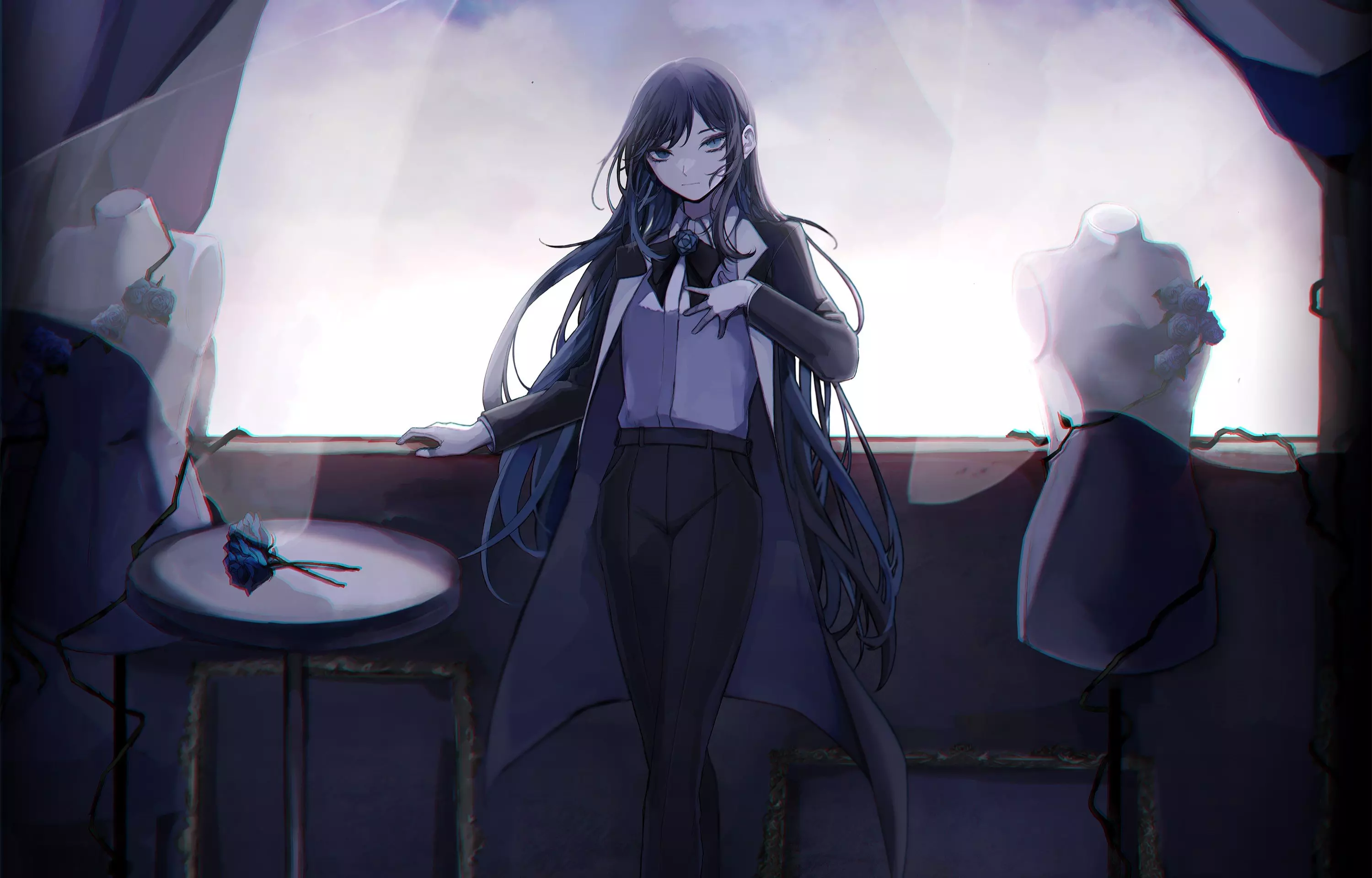
Get To Know Ado, The J-Pop Vocaloid Star Condemning Conformity
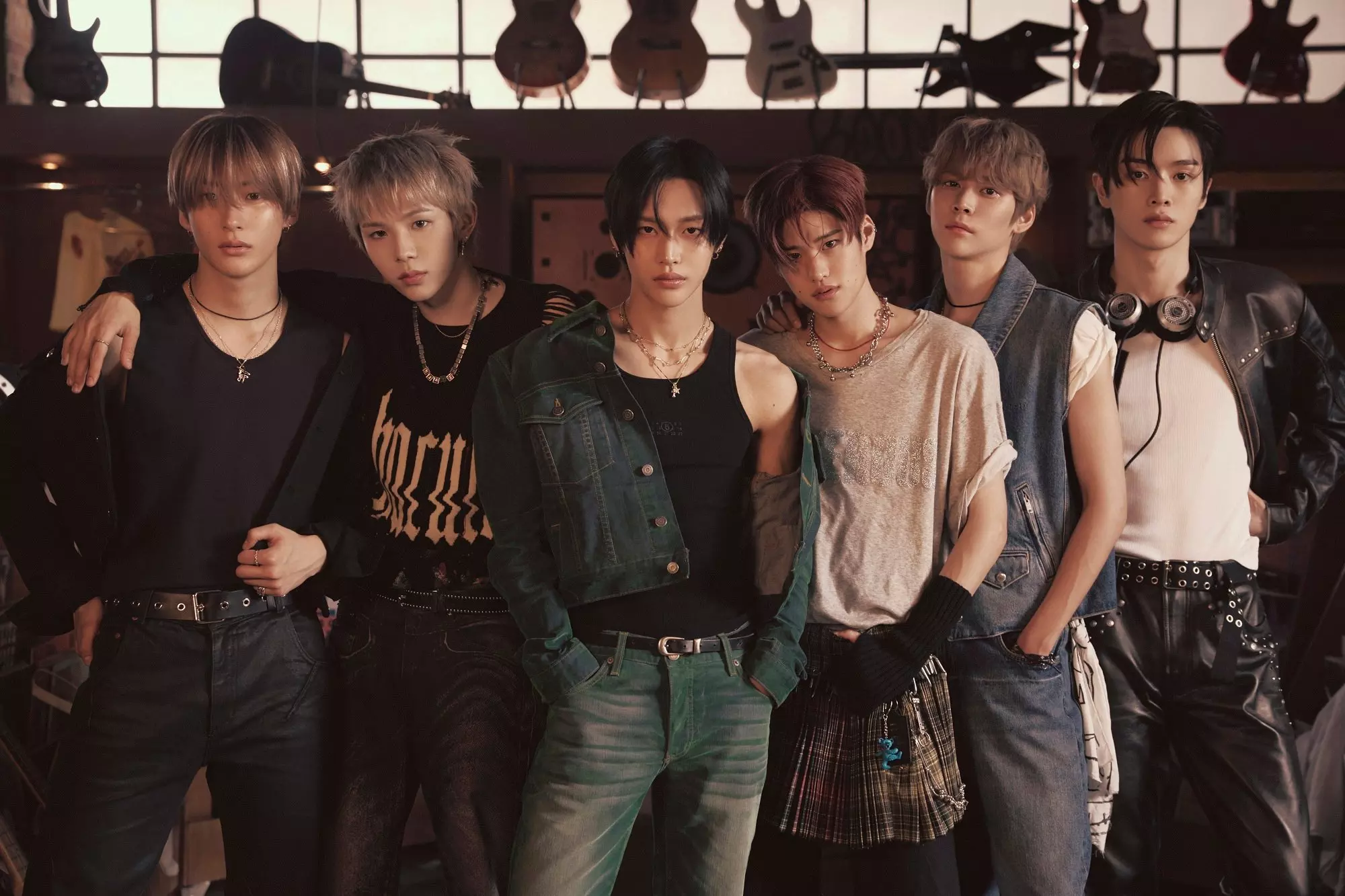
K-Pop Group RIIZE Detail Every Track On New Compilation 'RIIZING – The 1st Mini Album'
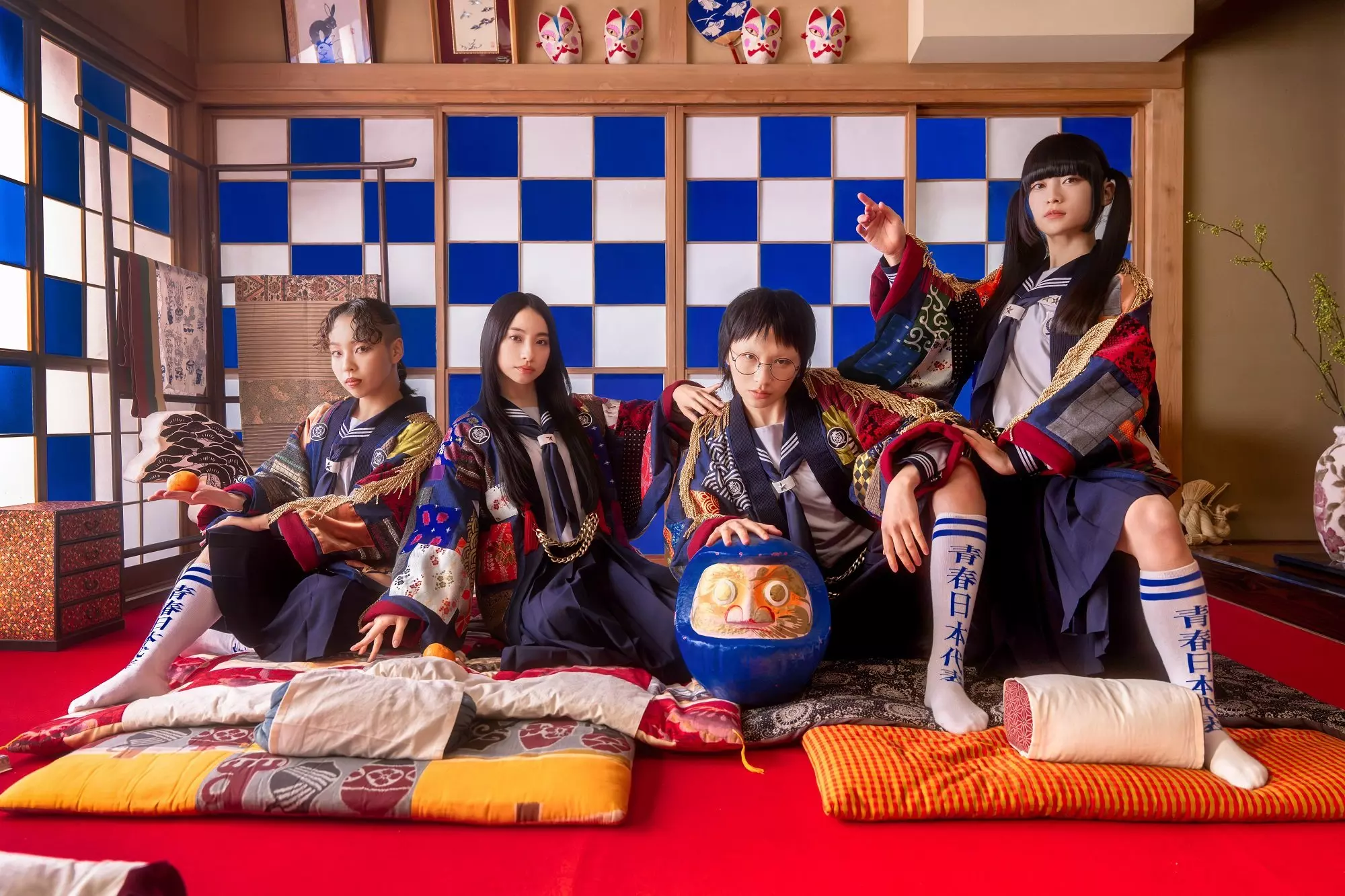
On 'AG! Calling,' Atarashii Gakko! Declare That Youth Is Never Lost — No Matter Your Age
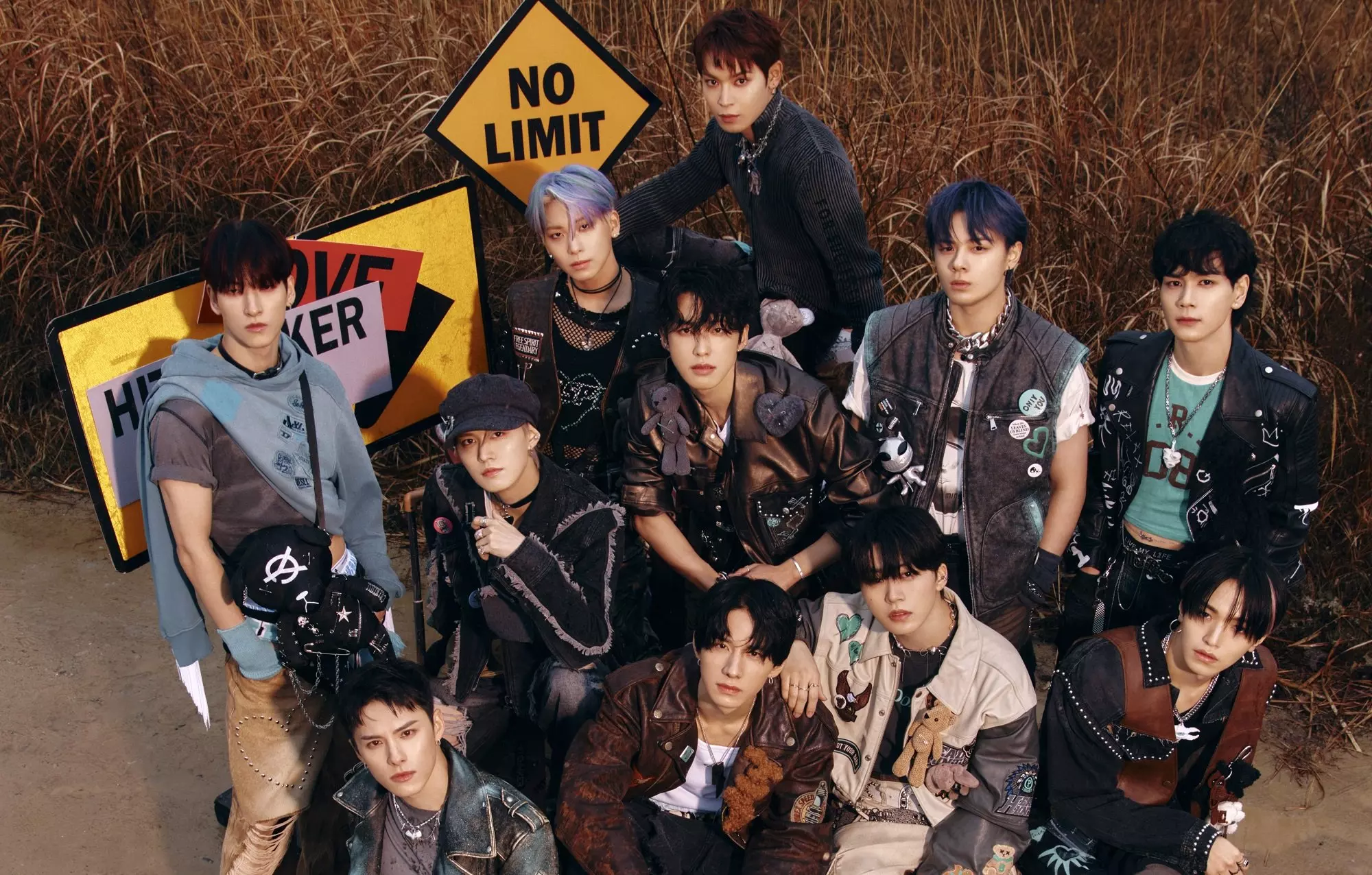
JO1's Big Year: Follow The J-Pop Group's Rise, From Their First U.S. Appearance To One Of Japan's Biggest Venues
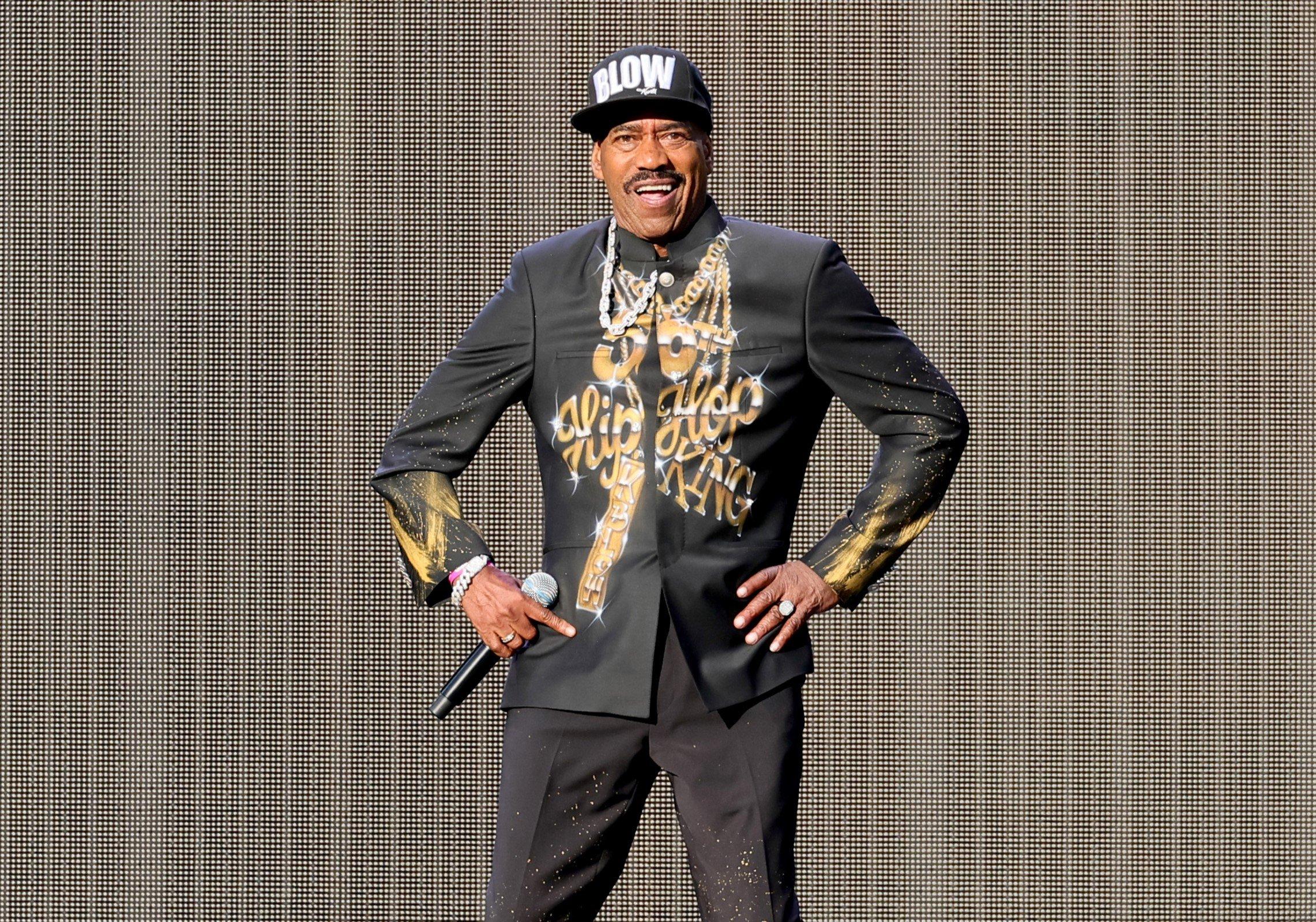
Photo: Theo Wargo/Getty Images
interview
Living Legends: Kurtis Blow On How Hip-Hop Culture Was "Made With Love" & Bringing The Breaks To The Olympics
More than 40 years after he became hip-hop's first commercial breakout star, Kurtis Blow is still moving the culture forward. The rapper and OG B-boy reflects on hip-hop’s rich history, and the impact of seeing hip-hop represented at the 2024 Paris Games.
On the eve of the first-ever Olympic breakdancing competition, hip-hop legend Kurtis Blow was thrilled. It was the first time one of the core elements of hip-hop culture had reached such a global stage.
Alongside DJ Kool Herc (whose breaks provided the soundtrack for B-boys and girls), Blow is credited with popularizing breakdancing. The rapper began breaking as a teenager in the early 1970s, as part of the Hill Boys breaking crew — named for the Sugar Hill area of Harlem where Malcolm X first started his galvanizing pro-Black movement —
And while the International Olympic Committee decided to remove breakdancing from the 2028 Olympics, Blow is unbothered. As far as he’s concerned, his legacy and the legacy of breaking itself is all but set in stone.
"It was definitely something special," Blow tells GRAMMY.com. "And I wasn’t the only one who realized it at the moment it was happening."
Born Kurtis Walker, the Harlem-based Blow began DJing when he was just seven years old. In 1979, the 20-year-old's "Christmas Rappin’" sold over 400,000 copies and turned the up-and-comer into a household name. But it was his follow-up single, 1980’s "The Breaks," that helped launch a whole new genre: rap music. "The Breaks" became the first hip-hop album to receive a gold certification from the RIAA, and proved that Blow wasn’t just a one-trick pony.
Kurtis Blow proved to be immediately influential on the then-nascent rap scene. When Rev. Run of Run-D.M.C. started his career, he billed himself as "The Son of Kurtis Blow" to give him an air of credibility that helped propel the hip-hop trio into the pop culture stratosphere. But Blow's influence didn’t begin and end with his "adopted son": Everyone from Russell Simmons to Wyclef Jean has worked with Blow, and he has been sampled by Nas ("If I Ruled The World" is all but an interpolation of Kurtis Blow’s song of the same name), KRS-One and many others. In fact, more than 100 songs have used samples from "The Breaks," and nearly 1,500 songs have used a sample or an interpolation from Blow’s discography.
Learn more: Essential Hip-Hop Releases From The 1970s: Kurtis Blow, Grandmaster Flash, Sugarhill Gang & More
Kurtis Blow was also one of the first rappers to sign to a major label (Mercury Records) and was the first rapper to be a multihyphenate (in addition to his music, Blow worked as an actor on films like In a Dark Place and California Dreamers, and was the musical coordinator for the legendary hip-hop film Krush Groove). Blow continues to work steadily in hip-hop today, though he eschews the legendary breaking parties in favor of cultural events that offer a new glimpse into the culture he helped create.
To wit, Blow is performing with The Hip Hop Nutcracker, in which Tchaikovsky’s classic score is set to breakdancing and modern hip-hop dance; the emcee will perform a brief set to kick off each show. A nationwide tour kicks off in Southern California in November and concludes at the end of December in Durham, North Carolina.
Kurtis Blow spoke with GRAMMY.com about the importance of bringing breaking to the Olympics, reconciling his ministry with modern hip-hop’s message, and his four-decade legacy.
This interview has been edited and condensed.
Breakdancing has been a huge part of hip-hop culture for many, many years — and it’s long overdue to be recognized on a global scale like the Olympics. What are your thoughts about seeing this movement that you started getting this kind of recognition?
This whole culture that we call hip-hop started back in the 1960s. With the Civil Rights movement, community organizers, and government officials all debating about something so basic: the right to all be seen as equal and free. It was a traumatic time, you know? But we had music that was so relevant to the whole movement.
By the time the late 1970s and early 1980s came along, everyone was trying to escape all of the traumatic racism that was still going on. And music became our escapism. That’s where breaking came in: everyone was just trying to mimic James Brown on the dance floor. You’d see one guy doing his thing, and everyone would form a circle around him. Pretty soon, someone else would join the circle and challenge him. And before you knew it, there was a whole competition — and whoever won became the most popular in the club.
That kicked it all off. To see it recognized on such a large scale just reaffirms, to me, that this hip-hop culture of ours was made with love.
There were breaking films such as 1985's 'Krush Groove' that were completely revolutionary in that it gave everyone — not just those within the culture — a view into the world of hip-hop, and suggested what it could become. At the time, you were becoming the first commercially successful rapper and one of the pillars of what would become the New York sound. Were you aware that you were on the precipice of something revolutionary?
I don’t want to call myself a visionary or anything like that, but I did know that this was something special, because I saw how quickly it spread around different boroughs in New York City.
From Harlem and the Bronx, and then over into Queens, Brooklyn, and even New Jersey, it was amazing to see everyone just gel around that whole hip-hop scene. As I said before, we all needed that escapism, you know? Forget about your troubles, just come and dance.
With me being in Harlem, right down the block from the Cotton Club and that whole mindset around dancing becoming America’s pastime — just coming from that era, where we had to go to the parties to have a good time — [I knew] that we had created something that would outlast us.
Not only did you attend divinity school, but you are also an ordained minister. How do you bridge those two aspects of your life and how do you reconcile being a rapper with being a minister?
That is such a great question, and thank you for asking.
It’s very simple: God is the Creator. God created hip-hop. We have to start with that, right here. God gave us the talent to perform the music; he gave us the passion to want to spread the music to the masses. He gave us the desire to say, "Hey, come take a look at me! God has blessed me with this — can you do this?"
Now, when you talk about the actual elements of hip-hop — that is, the emcees, and the message that we bring — it’s crucial to understand that we are commanded by God to uplift our community and to show them love. This is the actual essence of hip-hop: peace, unity, love, and just having safe fun.
My mission is to believe in the faith that God is real, and God is in the miracle business. I have seen nothing but miracles for the last 45-50 years in this thing called hip-hop. And it’s important to understand that God is in the mix, and we are all blessed by the common denominator known as hip-hop. It should be our mission to get that back.
As for what’s going on today — the nature of the lyrics, the gangster rap, and all the violence — it didn’t really start out that way, did it? And if we can inspire the future for our youth, then we’ve made a difference. Because the future is in their hands, and we need to inspire them.
But, as a counterpoint, times are different today. And what these men and women are speaking to may not necessarily be destructive — rather, there could be a case made where they’re merely being street poets, and telling the reality of life as they see it. What advice would you give to those people who are telling a different story than the one you told all those years ago?
We are called to be these soldiers, warriors, servants, and communicators. So I understand their reality is different, you know? The world is upside down. The kids out there are just telling it like it is. They’re communicating their reality.
But I think that we should not only communicate how it is, but how it could be. And how it should be.
Think of how different it would be if they also gave some inspiration for a positive future: "Yeah, we goin’ through this, we goin’ through that, but with God, you can overcome all of that. With prayer, you can have miracles, and blessings, come down."
Even if you just understand the nature of the reality that we’re going into right now — things like mass incarceration, the drug epidemic, gun violence, the war profiteering off of Black and brown bodies — it falls upon the shoulders of the elders of this community, this hip-hop movement, to inspire and communicate the possibilities to the younger up-and-comers.
They need to understand that they are the product of royalty. They are the descendants of kings and queens of Africa. They need to honor themselves and honor their ancestors, accordingly.
The culture of hip-hop isn’t just about the music. It’s about fashion, slang, cars, the sports — if you think about it, anthropologically, hip-hop is a civilization onto itself. But, as with all things, so much of it has been co-opted and mainstreamed. How do we bridge the divide between the originators and the colonizers?
Only love can bridge that gap between the ages, the races, our government — the diversity of all these different countries — you know, it needs to be all love.
This is what it’s going to have to take for us to change our present reality. And I feel that in hip-hop, that is the key to that future. The OG’s had the right mindset: peace, love, unity, and having safe fun. We need to get back to that.
When you look back on your career and the legacy you leave behind, how do you want to be remembered?
I remember being in divinity school at Nyack College in New York, and the professor asked the whole class the same thing. And I thought about it for a while, you know? I thought about being remembered as a pioneer of hip-hop — an OG breakdancer — a DJ when I was just seven years old — and an incredible educator.
But what stuck with me was being known as a man of God. That’s it. Because that encompasses everything that I have been through and survived. All of my success, and everything you know about me, comes from God — and to God be the glory.
Latest Rap News & Music

Epik High Are Still Pumped After All These Years: How The Korean Hip-Hop Trio Broke All Their Rules By Going Back To Basics

Watch Kendrick Lamar Win Best Rap Album In 2016
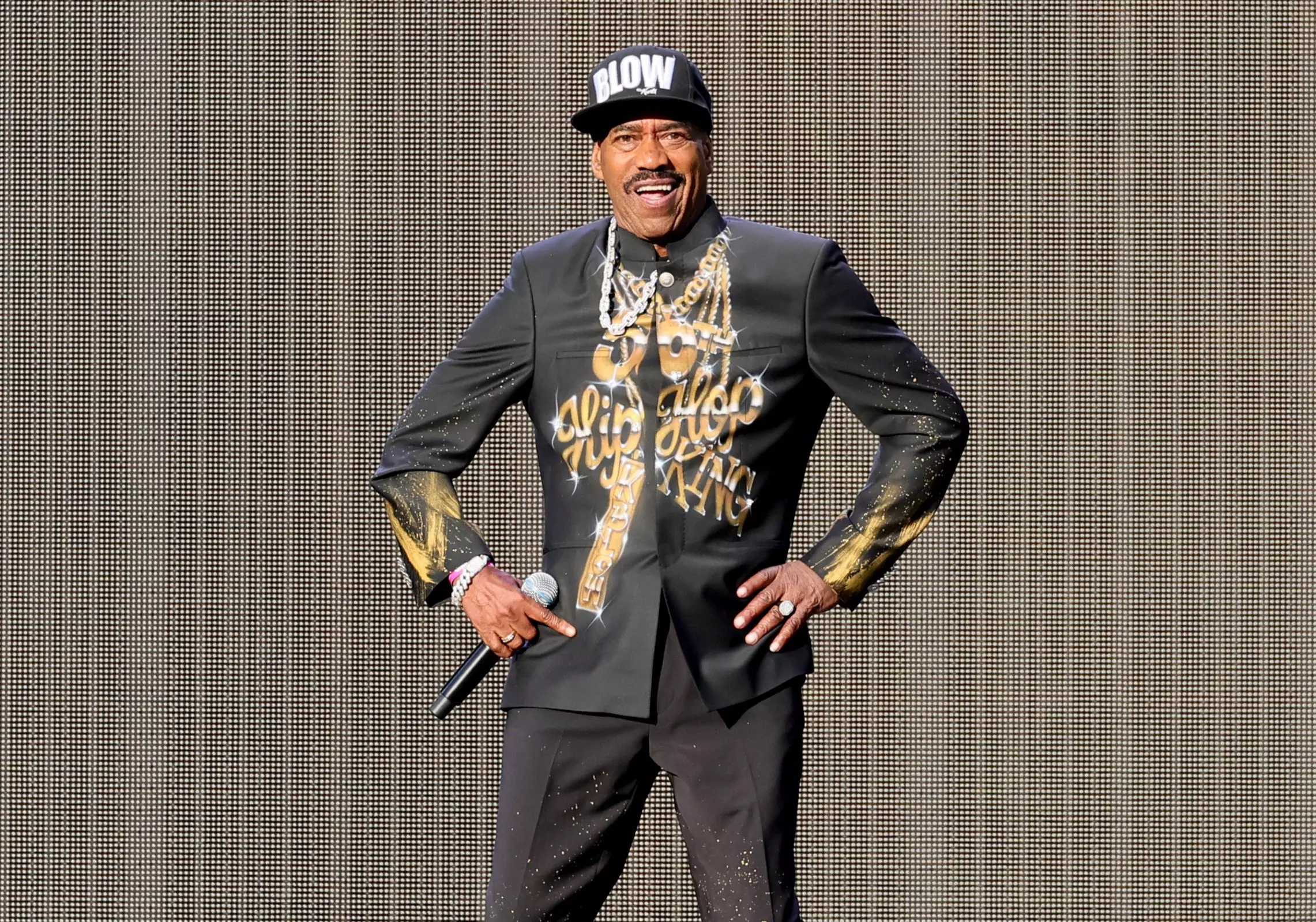
Living Legends: Kurtis Blow On How Hip-Hop Culture Was "Made With Love" & Bringing The Breaks To The Olympics
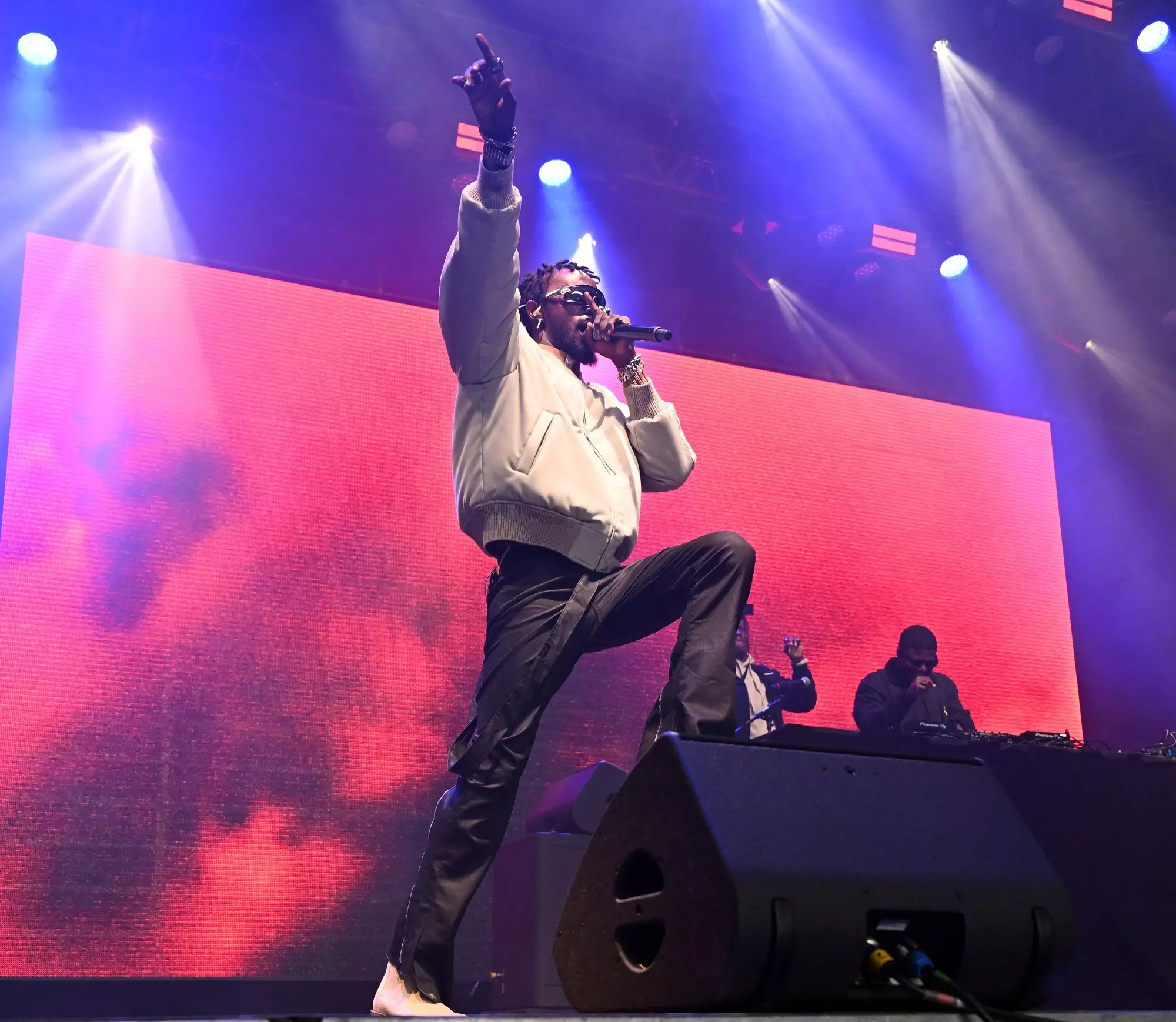
10 Artists Essential To Ghanaian Hiplife: Reggie Rockstone, Sarkodie, Mzbel & More

Ice Spice Is The Drill Queen On 'Y2K!': 5 Takeaways From Her Debut Album
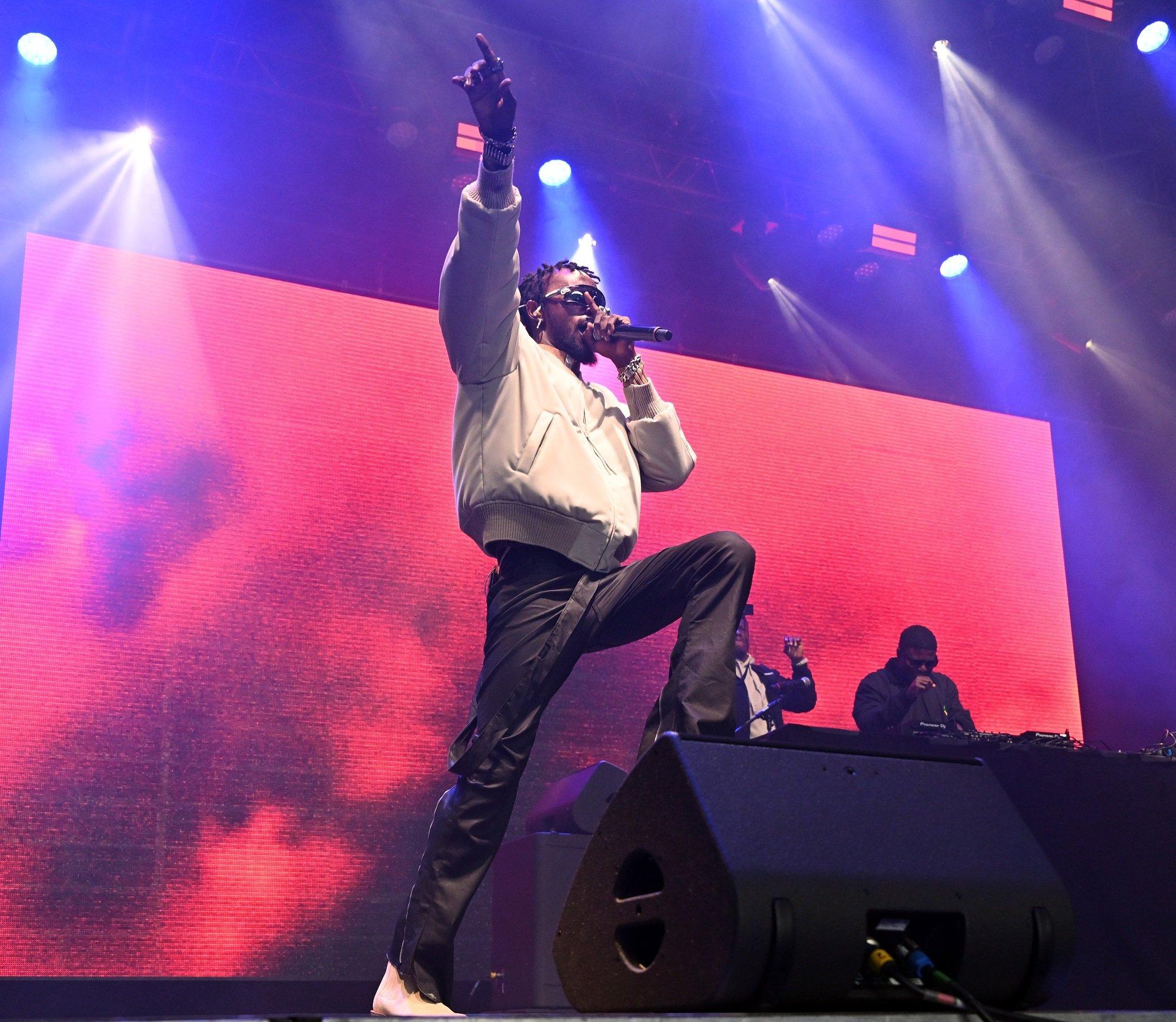
Photo: Rune Hellestad - Corbis/Corbis via Getty Images
list
10 Artists Essential To Ghanaian Hiplife: Reggie Rockstone, Sarkodie, Mzbel & More
In the 1990s, artists and producers from Accra merged the sound and aesthetic of American hip-hop with their Ghanaian sounds and culture. The resulting genre, hiplife, significantly influenced the music coming from Ghana and the African continent.
Ghana has been home to some of the most recognizable musical exports from the African continent, contributing heavily to the globalization and development of the continent's sound. While highlife is regarded as the country’s biggest sonic export, the introduction of hiplife some 30 years ago invigorated the Ghanaian music scene and birthed some of the country's most important artists.
Hiplife music blends hip-hop from the West with Ghanaian highlife sounds like Jama and Kpanlogo — a sound and dance by the Ga people, who make use of nono (metal bell), fao (gourd rattle), and local drums to play beats. These elements were fused with funk, bass, and boom-bap to create hiplife. Hiplife and hip-hop have aural similarities and both use rapping; both genres also reflect a larger culture.
While Gyedu-Blay Ambolley is considered one of the earliest rappers, as demonstrated on his 1973 song "Simigwa-Do," the term "hiplife" was only coined in the late 1990s by genre pioneer Reggie Rockstone. Still, American hip-hop had arrived in the Ghanaian capital of Accra by the early '90s and local rappers began to release their own music soon after. Duo Talking Drum were among this early cohort, and their single "Aden" was an underground hit in 1993.
As a movement and culture, hiplife is also an identity, created to encourage people to be daring in their exploration of sound. Pioneering hiplife artists like Root Eye Samini and Shatta Wale (then known as Bandana) fused dancehall and highlife in the early 2000s to make music which could connect with local audiences.
Collaborations between artists and producers have been crucial in defining the sound, evolution, and amplification of hiplife. Just as hip-hop has developed a plethora of subgenres, hiplife has birthed other sounds such as azonto and asakaa. An offshoot of asakaa, Ghanaian drill, was among the elements in the new Best African Music Performance Category at the 2024 GRAMMYs.
The story of hiplife includes many important producers, artists and labels, including Kassa Records, DJ Rab, Zapp Mallet, Akyeame, Panji Anoff, JayQ, Hammer, Ex Doe, Chicago, and Okomfour Kwadee. Going forward, the mantle will fall on artists like TicTac, Abrewa Nana, Appietus, and much later a younger generation including Asem, Richie Mensah, and Beeztrap KOTM continue to amplify hiplife. Afrobeats artists have also taken notice; Tic Tac and Tony Tetuila’s "Fefe Ne Fe" was sampled on the 2019 song "Gbese" by DJ Tunez feat. Wizkid and Blaqjerzee.
With African music continuing to gain global recognition, the rich sounds emanating from the African continent are ripe for exploration. Read on for 10 artists who have been essential to the story of hiplife music.
Reggie Rockstone
Reggie Rockstone is regarded by many Ghanaians as the godfather of hiplife, having paved the path for many to pursue rapping as a career. Working with producers like the late Rab Bakari (DJ Rab Bakari), Reggie set the ball rolling for hiplife through songs like "Tsooboi."
His 1997 album Makaa Maka offered an early template for the sound, fusing Western-influenced hip-hop with traditional Ghanaian highlife sounds. The linguistically adept Reggie Rockstone — a Ghanaian boy who was raised in the UK and New York — rapped in both English and impeccable Ghanaian Twi to the shock and admiration of many. By this singular act, he proved that it was cool to rap in your own dialect and not necessarily in English, like American rappers of the '90s.
Reggie's will to make Ghanaian rap music stand out via releases like Me Na Me Kae, and Me Ka did not go unrewarded. He also scored hits with his singles "Keep Your Eyes on the Road," "Plan Ben," and "AH." He has also collaborated withdancehall giant Beenie Man and Nigerian legend 2Face.
Lord Kenya
Lord Kenya rose to fame when he joined Slip Music, one of Ghana’s celebrated music labels of the late '90s and mid-2000s. His musicality was undeniable, and his hardcore rap style was adored by many for its energetic flow and delivery. Likened to Tupac Shakur, Kenya was very direct whenever he was on the mic. He never shied away from any lyrical battle thus earning him the title "rap heavyweight." His swagger on and off the mic made him a star, with many eager to catch him anytime he performed.
Lord Kenya's street affinity, coupled with great stage performances, left a mark on Ghanaian audiences. His albums — including 1998's Sika Card, Yesom Sika, and Sika Baa — solidified his position as one of hiplife’s most important artists. Kenya's hit singles "Enyomo," "Medo" and "Sika Mpo Mfa Neho" as well as his verse on the late Daseebre Dwamena’s song, "Kookoo" ushered in a street approach to the rap scene, as seen in the careers of rappers like Kwaw Kese and Kweku Smoke in later years.
Obrafour
Revered, celebrated, and crowned by music rap purists in Ghana as "Rap Sofo" (high priest of rap), Obrafour influenced multiple generations of rappers in Ghana. The artist first gained popularity in the late '90s with his cadence and mastery over his mother tongue, Twi, as well as his storytelling, lyricism, and wisdom.
Obrafour’s flow complemented the work of legendary producer Hammer, who brought hard-hitting drums, horns, and legendary sharp chords to Obrafour’s 1999 album Pae Mu Ka. The album is regarded as the bridge that connected older audiences who dismissed hiplife as a passing fad and the youth, who regarded hiplife as the future of Ghanaian music. Today, Pae Mu Ka is as important to hiplife as Nas’ Illmatic is to hip-hop.
Pae Mu Ka was the first of several collaborations between Obrafour and Hammer. Together, they created a sound that would influence generations of rappers. Obrafour is held in high regard by rappers such as M.anifest, Guru, Ko-Jo Cue, and Pappy Kojo.
VIP
Established in Nima, a suburb of Accra, VIP underwent significant personnel changes but never let their commitment to hiplife music falter. Original member Friction later onboarded Promzy, Prodigal, and Lazzy (who later changed his name to Zeal), and Bone championed the vision of the group for over a decade (as well as the departure of Friction, Bone and Promzy).
Backed by the group's diverse personalities, VIP quickly became one of the biggest music exports of the country, winning six awards at the Ghana Music Awards in (2004), including Song Of The Year for the 2003 hit title track "Ahomka Wo Mu." Over a two-decade period, the group released albums and scored several hits and collaborated with some of the continent's finest, including 2Face, Patoranking and a host of others. Vision in Progress (VIP) epitomized the cultural ethos of hiplife: raw energy, passion and talent.
When Reggie Rockstone, a longtime admirer of the group, arrived in 2014, the group became VVIP. The group’s success would be further cemented as they crossed over into Nigeria and other parts of the world. "Ahomka Wo Mu" has been sampled and interpolated by various musicians, including songs by MUT4Y & Wizkid and Kida Kudz.
Tinny
While Twi rapping artists dominated the hiplife music industry, very few artists were successfully making music in other local dialects. Tinny — a rapper who raps in Ga, a language spoken by the people of Accra — rose to the occasion with both rap and fashion. Another product of Hammer’s Last Two record label, Tinny had an unmatched aura that earned him the moniker "Sexy Man Tinny." Early aughts albums such as Makola Kwakwe, Aletse (Akwe Polo), and Kaa Bu Ame still echo in today’s industry. His later works with record producer Richie Mensah on singles like "Ringtone" and "Now I Know" further entrenched his name in Ghana’s hiplife history.
Tinny’s will to pursue rap music in Ga laid the foundation for artists such as Edem, who raps predominantly in Ewe and to a degree music duo Blackstone who performed in Dagbani. Tinny also featured in the BET Hiphop Awards International Cypher (Ghana) alongside Reggie Rockstone, Sarkodie, D Black, Edem, Kwaku-T and Baby G (2010).
Mzbel
In a male-dominated industry, Mzbel created change that still reverberates today through the careers of women like Amaarae, Wendy Shay, Sister Afia and Gyakie. Following in the footsteps of those before her, like Abrewa Nana (a household name in the early 2000s for her role as one of the leading female artists in hiplife), Mzbel's singing and rap skills were not just catchy, but thought-provoking with themes of love, sex, body positivity, and addressing abuse.
Mzbel's non-conformity made her a target by some aspects of the industry. The general public who felt she was a bad influence on younger girls, due to the sensuality in her lyrics and imagery. Yet she was unphased. Mzbel scored national hits with her albums Awosome, and 2005's 16 Years, and touched on issues many regarded as controversial. The rapper stood up for women’s rights and encouraged women to be vocal about things society heavily criticizes women for. She ensured that women were not bullied into silence but instead express themselves fully through art. Her hit single "16 Years" with the late Castro touched on the issue of sexual harassment and abuse young girls face at the hands of older men and, as such, became a national topic.
Sarkodie
Since bursting onto the scene in 2008, Sarkodie has churned out multiple hits year after year with a unique flow and delivery. His records touch on multiple subjects, including friendship, family, love, heartbreak, and bad governance. His hold over rap in Ghana has been extended across the continent, making him one of the most influential rappers in Africa.
In 2012, Sarkodie played a pivotal role in the amplification of azonto music (an offshoot of hiplife that melds dance music genre from the early 2010s with upbeat fast-paced sounds and witty comical lyrics) with his song "U Go Kill Me" with fellow rapper E.L. Winning "Artist Of The Decade at the" Ghana Music Awards (2019), cemented his influence and status.
Rapping predominantly in Twi, Sarkodie’s ability to find pockets on the beat has made him a frequent featured artist by the likes of Mr. Eazi, Ice Prince, Flavour, Victoria Kimani, Patoranking and a host of other important artists in Africa. Sarkodie won Best International Act: Africa (2012) and the inaugural Best International Flow at the BET Hiphop Awards in 2019.
Asakaa Boys
In a time when hiplife had taken a back seat to Afrobeats and amapiano on the Ghanaian market, a group of artists from Kumasi (Kumerica) — a slang used to describe people of Kumasi who enthusiasts of American music and culture — burst onto the scene via asakaa, or Ghanaian drill. Inspired by Pop Smoke’s drill music, the sound reflects their lifestyle on the streets of Kumasi, hiplife elements, and American hip-hop culture such as fashion.
The name asakaa originates from the word saka, a flipped slang of the Twi word kasa, which means to speak. Saka, a style of speaking where words are pronounced backwards, was heard in the songs that were released by the Asakaa Boys. The asakaa sound is credited to the Kumasi-based Life Living Records, and signees Jay Bahd, Kawabanga, O’Kenneth, City Boy, Kwaku DMC, Reggie, Sean Lifer, Braa Benk and Skyface SDW under the moniker The Asakaa Boys.
With songs like "Akatafoc", "Sore," and "Agyeiwaa," and leading the charge, Asakaa (Ghanaian Drill) has gained recognition locally and internationally in the 2020s.
Black Sherif
Black Sherif may be young, but he has already charted a path of success for himself in Ghana’s music industry which many are yet to match. Black Sherif’s sound, writing, fashion, and mannerisms have earned him admiration. He first tasted popularity when his song "Money" went viral in 2019; two years later he regained public attention in 2021 with his First and Second Sermon songs and after a Burna Boy cosign on "Second Sermon Remix," Black Sherif's popularity soared.
The artist has gone on to deliver multiple hit songs such as "Kweku The Traveller," "Soja," and a monstrous guest verse on Odumodu Blvck’s "Wotowoto Seasoning." In 2023 he won Artiste of the Year at the Ghana Music Awards and aBET Awards Best International Award. Additionally, he has performed on global stages atMOBO Awards, Wireless Festival, and 2023's AfroNation.
King Paluta
With a charisma like that of Lord Kenya, King Paluta is an energetic rapper with some "thugness" in his delivery influenced by life on the streets of Kumasi. As a young man, he often slept in the studio, where he learned how to operate the equipment in the studio and dropped his first official single in 2015.
Despite releasing music and being popular in Kumasi, he would only gain national attention in 2023 for "Yahitte," which earned him the award as the Best New Artist at The Ghana Music Awards in 2024. In the 2024 alone, he has scored two charting-topping singles, "Aseda" and "Makoma," making him arguably the hottest artist in Ghana.
As a student of hiplife, King Paluta has fully embodied the genre as evident in his music. He has positioned himself to carry on the legacy of those before him as far as hiplife is concerned, and he is on track thus far.
More News About African Music

10 Artists Essential To Ghanaian Hiplife: Reggie Rockstone, Sarkodie, Mzbel & More
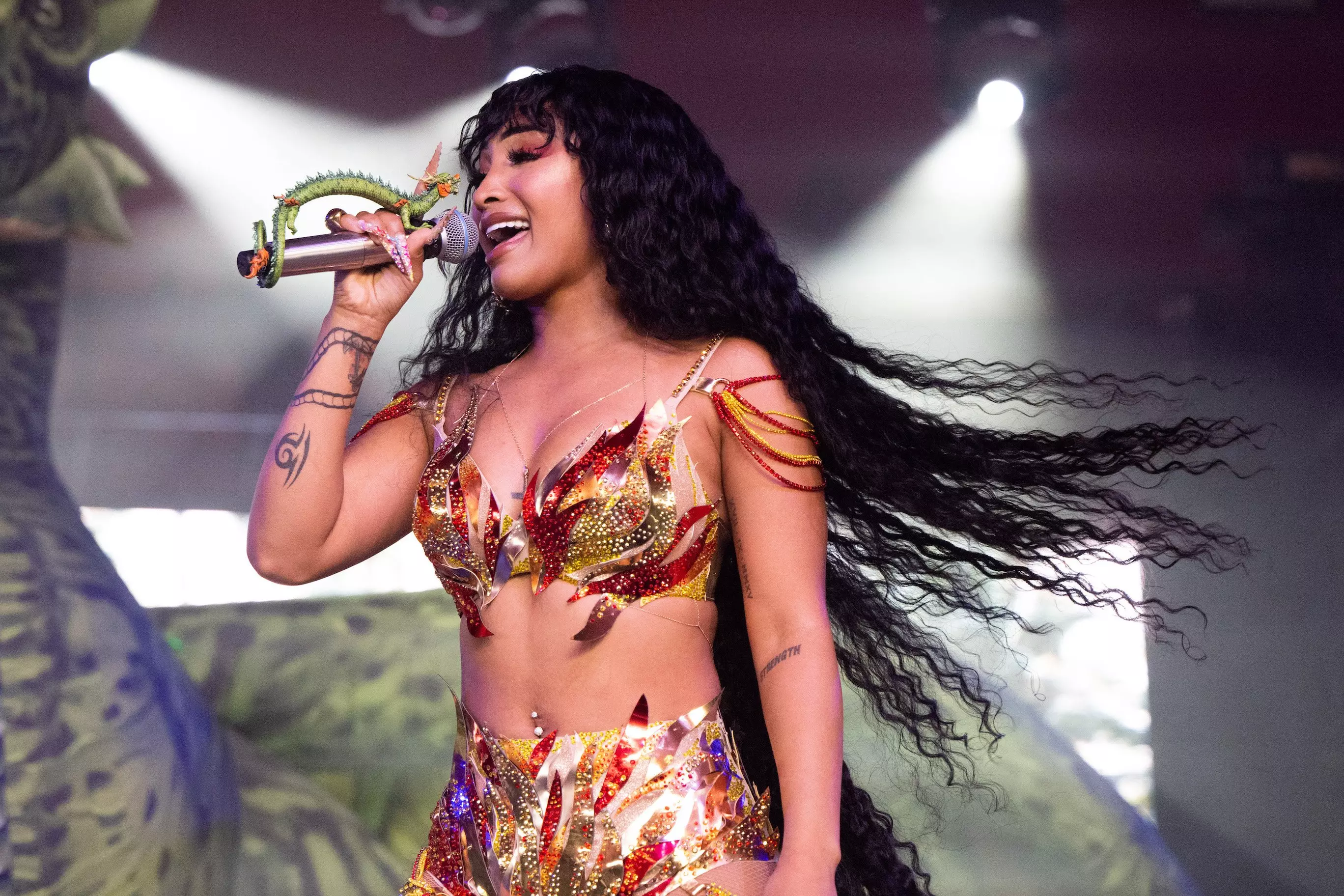
8 Can't-Miss Acts At Afro Nation Detroit 2024: Shenseea, Ayra Starr, Kizz Daniel & More
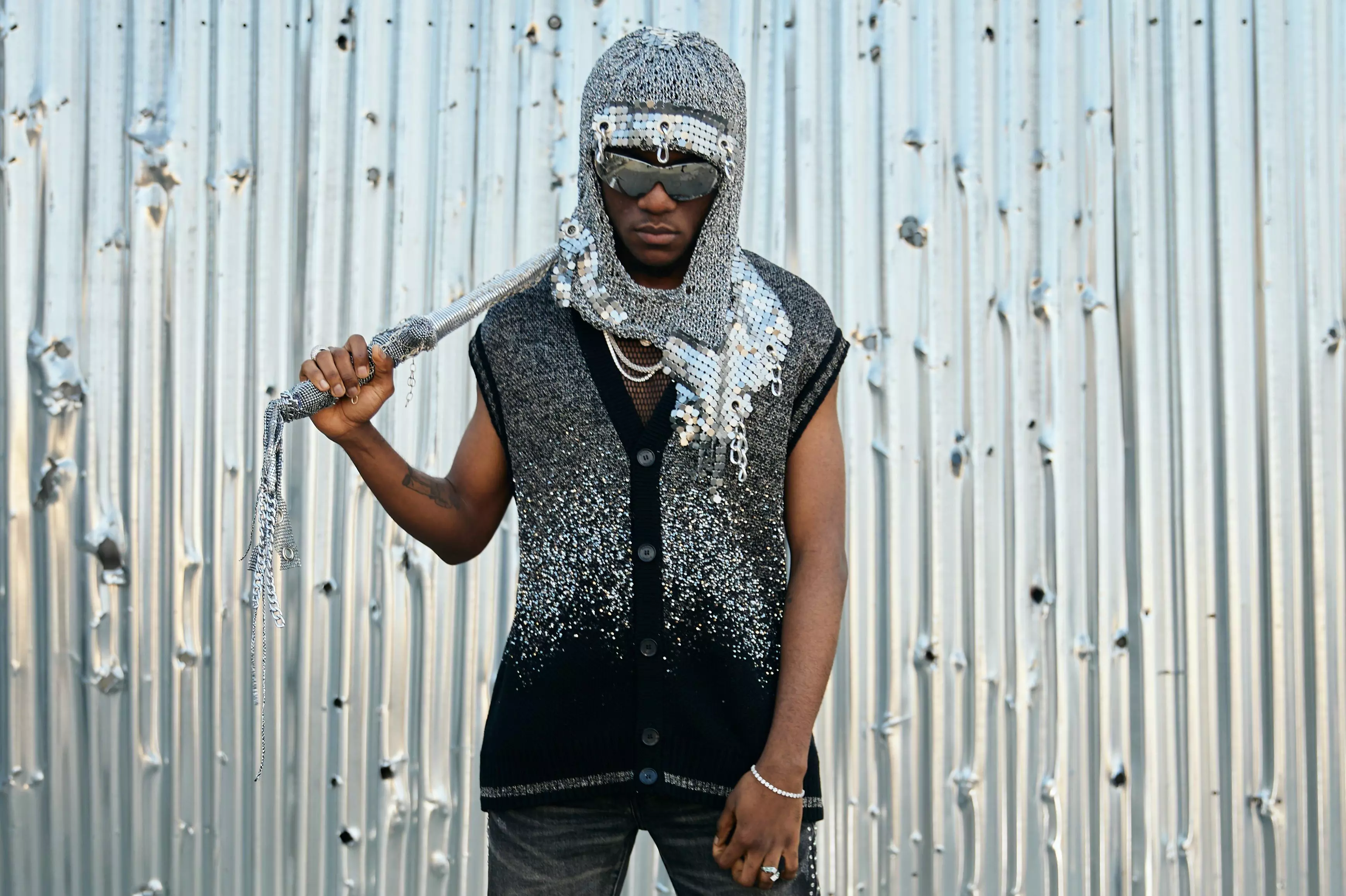
Meet Victony: The Afrobeats Sensation Sharing Importance Of Being 'Stubborn'

Watch Candy Bleakz Share Her AKG Microphone
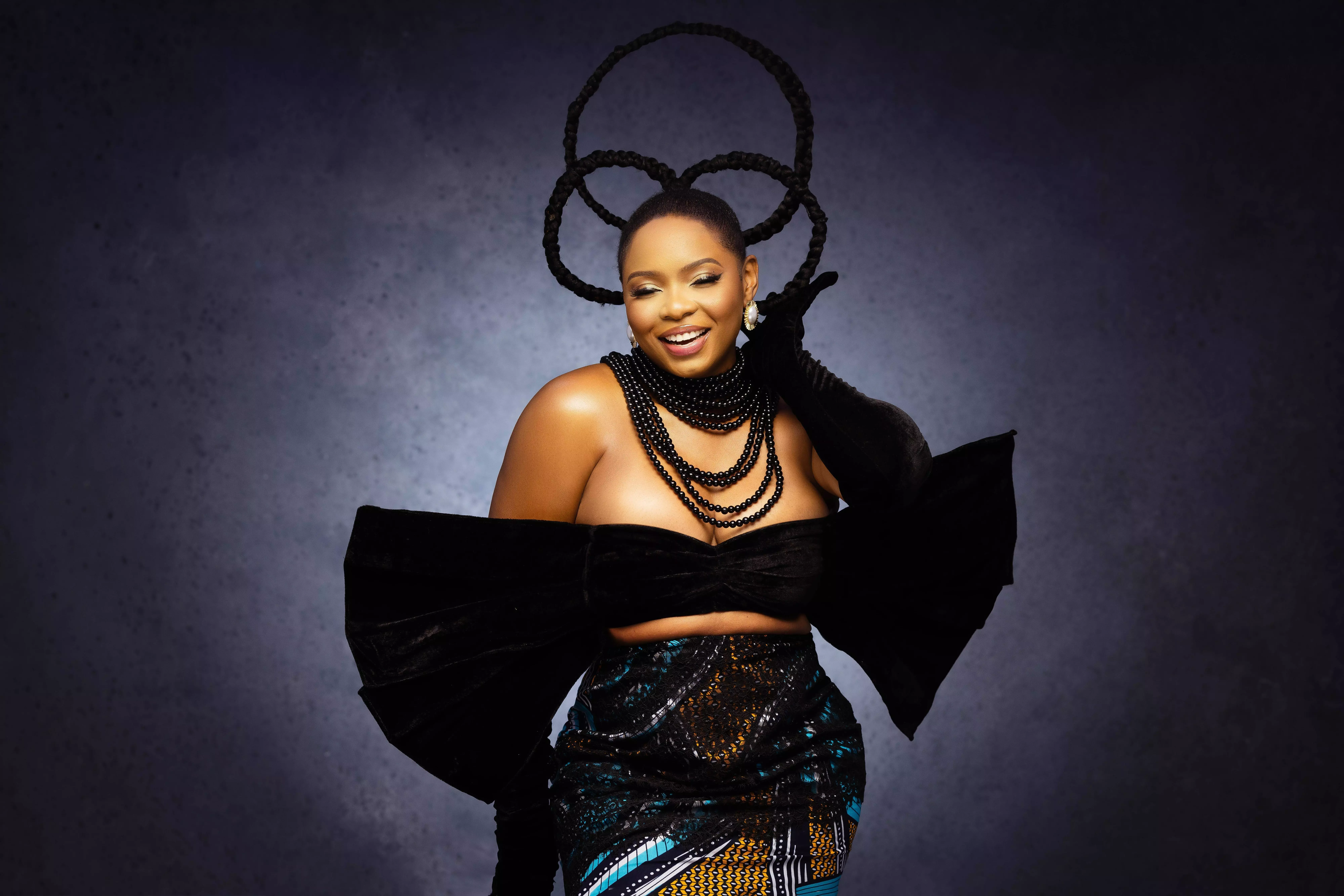
Afropop Legend Yemi Alade On New Album, 'Rebel Queen,' Historic Hits, & Working With Beyoncé
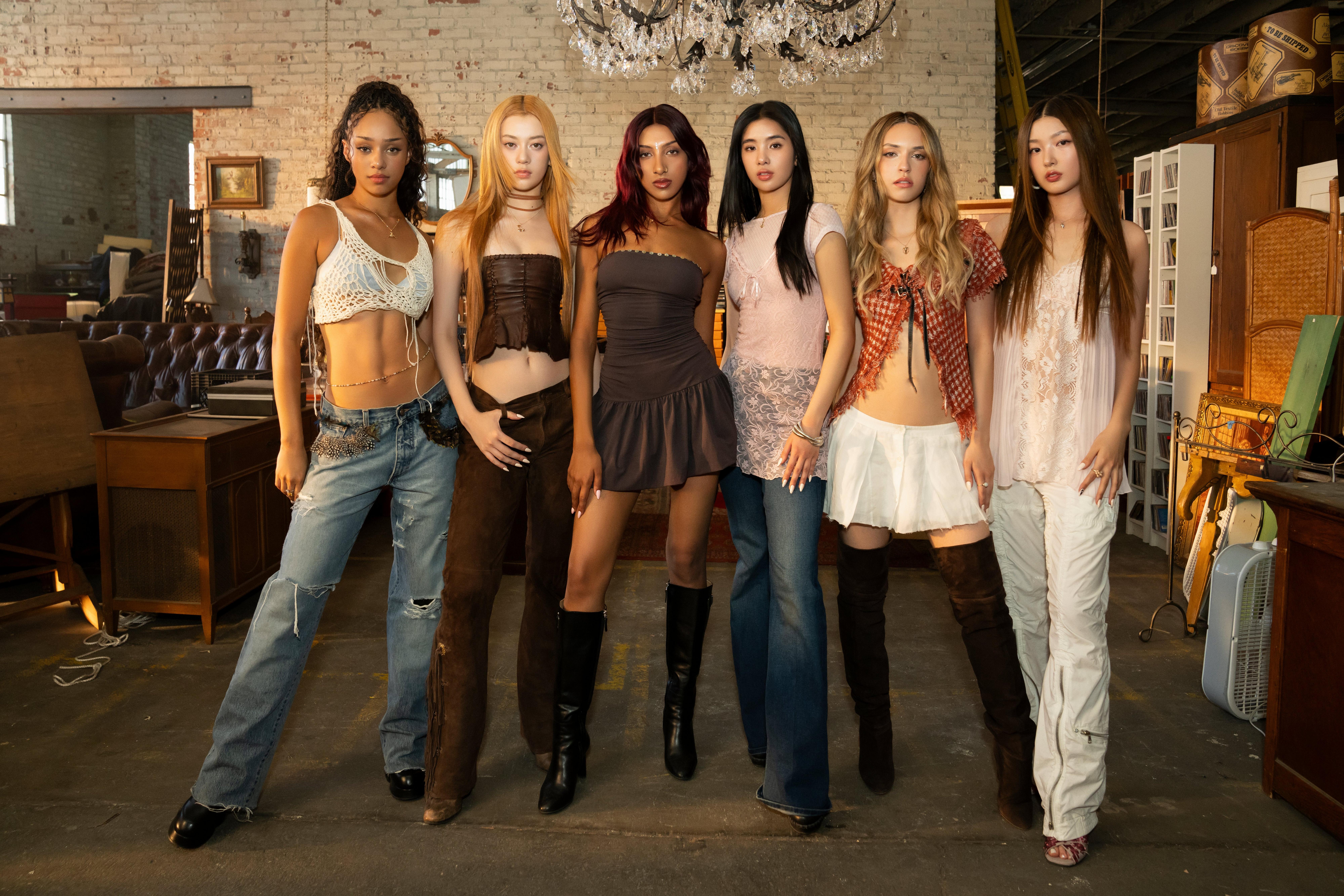
Photo: Jane Kim
list
Get To Know KATSEYE: The Global Girl Group Styled After K-Pop Superstars
The first-of-its-kind group is the project of Geffen Records and Korean entertainment giant HYBE. Learn all about the six-member group, from their journey as trainees on "Dream Academy" to their debut album, 'SIS (Soft Is Strong).'
Although they have yet to release an album, six-member girl group KATSEYE has already racked up a passionate global fanbase. Those fans have eagerly followed KATSEYE's journey so far, which span nearly three years and multiple continents.
KATSEYE is the result of a highly anticipated, first-of-its-kind partnership between American label Geffen Records — which counts Olivia Rodrigo and Camila Cabello on its roster — and HYBE Entertainment, best known as the home of BTS and subject of a new GRAMMY Museum exhibit. Thanks to the collaboration between two cultures with a track record of turning artists into household names, KATSEYE's Sophia, Manon, Daniela, Lara, Yoonchae, and Megan are poised for the global stage.
"This is the most ambitious project both HYBE and Geffen have ever been involved in," Geffen Records President Tom March (now Chairman and CEO of Capitol Records) said during a 2023 press conference, per Weverse Magazine. "We are hoping to create something that genuinely moves culture with a group that makes magazine covers and headlines festivals."
Ahead of the Aug. 16 release of their debut album SIS (Soft Is Strong), GRAMMY.com rounded up everything you need to know about the rising stars, from their in-depth training process to their global roots.
They Competed Against More Than 100,000 Hopefuls
In late 2021, HYBE and Geffen kicked off a worldwide search for potential members of the group that would become KATSEYE. "In the city of dreams where stars are born, an unprecedented girl group will rise," boasted the promotional video.
Through online and offline auditions in 15 cities around the world, more than 120,000 talented artists tried out. Only the top 20 girls were selected to become finalists — an acceptance rate tougher than elite universities.
Revealing the finalists at an August 2023 press conference in Los Angeles, HYBE Chairman Bang Si-Hyuk said, "I have wanted to form an international group based on K-pop methodology for a while," per Billboard.
Geffen Records CEO John Janick shared the same sentiments. "To develop a global group with Bang, with the best of K-pop methodology, and our Geffen team, is truly special and will bring to life a first-of-its-kind experience in music," he said during the press conference.
They Went Through The Intense K-Pop Trainee System
The 20 finalists were enrolled in what was dubbed "The Debut: Dream Academy," an "X Factor"-style survival show that was broadcasted in real time on social media for nearly three months in late 2023.
"Dream Academy" offered the finalists a crash course in the infamously rigorous K-pop trainee system, one where aspiring stars train intensely in everything from vocals to dance and foreign languages, all with the aim of developing into well-rounded artists. Through a combination of audience voting and evaluations from a panel of experts (which included executives from HYBE and Geffen), the show whittled down the 20 finalists to the debut group.
The show consisted of three rounds with distinct "missions" that tested each finalists on their dance and vocal prowess, as well as their teamwork and performance skills. The contestants were primarily based in Los Angeles but also had the opportunity to travel to South Korea to train directly in HYBE’s Seoul headquarters.
The final lineup was revealed live on Nov. 17, 2023, with a studio audience in Los Angeles and thousands of viewers watching in real time. The energy and anticipation was palpable as each member was announced one by one to tears of joy and screams of excitement.
"I can’t even put it into words," expressed Lara after she was selected as part of the final lineup. "This is everything I ever wanted in my entire life."
The official group name of KATSEYE was also revealed on that date, signaling the transition from the trainee process to becoming a full-fledged group.
The entire training and development journey was documented by Netflix and will be released as a series under the name "Pop Star Academy: KATSEYE" on Aug. 21. The show promises to "pull back the curtain on the rigorous process of making a global music sensation."
KATSEYE Members Hail From Around the World
The six members of KATSEYE represent a mosaic of cultures and backgrounds from around the world. Sophia is from the Philippines, while Yoonchae was born in Korea. Manon was raised in Switzerland to Swiss Italian and Ghanian parents.
The three American members also have global roots: Daniela is Venezuelan Cuban, Lara is Indian, and Megan is Chinese Singaporean.
While KATSEYE’s music is sung in English, the members are also fluent in their fair share of languages, allowing them to connect with fans around the globe.
The diversity of the members even influenced the group name. KATSEYE is an alternate spelling of the stone cat’s eye, which "shows off a variety of colors depending on its direction, much like all of us who come from all different cultures and backgrounds," the members told Sweety High.
Industry Elites Form Part Of Their Team
Even ahead of their debut album drop, KATSEYE has already worked with some of the most prominent names in the entertainment world.
The group’s creative director is Humberto Leon, best known as co-founder of iconic fashion brand Opening Ceremony. His vision helped create "Dream Academy’s" whimsical Art Film of the finalists performing inside an empty school; he’s also had input on all the creative decisions for the group, from styling to posing.
"I want each and every one of them to stand out," Leon told the New York Times.
KATSEYE’s first single, "Debut", was produced by three-time GRAMMY winner and OneRepublic frontman Ryan Tedder, who has written songs for icons like Taylor Swift and Adele.
Their Labelmates Are K-Pop Superstars
As part of HYBE Entertainment, KATSEYE is the successor to some of the biggest names in the K-pop world. HYBE is best known for launching BTS in 2013, when the label was still known as Big Hit Entertainment.
HYBE has since expanded and launched groups including TOMORROW X TOGETHER, LE SSERAFIM, and New Jeans, who have all achieved massive heights, from topping the Billboard charts to performing at Coachella.
Ahead of the "Dream Academy" competition, HYBE artists imparted words of wisdom to the contestants in a video letter. "The more challenges you face, you’ll have more worries," said Le Sserafim member Sakura, who made her own debut through a similar competition show in South Korea. "I think the most important thing is to have fun!"
Read more: 5 Takeaways From The GRAMMY Museum’s "HYBE: We Believe In Music" Exhibit
KATSEYE's Music Is About Self Confidence
Although the group has released just two singles so far, KATSEYE’s music has already honed in on themes of confidence and empowerment. The first single, aptly titled "Debut," is an upbeat pop anthem that boasts the group’s self-assurance despite being industry newcomers. Second single "Touch" is an R&B and drum-and-bass-influenced ode to independence.
Their debut single is "really just about sisterhood and being confident and strong and powerful and the best version of yourself," Lara told Teen Vogue.
Listeners can expect a continuation of this theme on their upcoming album, SIS (Soft Is Strong). "Our debut comes with a lot of confidence and a lot of willpower and passion," Sophia hinted in the group’s intro film.
More K-Pop News

Epik High Are Still Pumped After All These Years: How The Korean Hip-Hop Trio Broke All Their Rules By Going Back To Basics

Meet ME:I, The J-Pop Group Who Want To Give The World A 'Hi-Five'

Get To Know KATSEYE: The Global Girl Group Styled After K-Pop Superstars

5 Takeaways From The GRAMMY Museum’s "HYBE: We Believe In Music" Exhibit

KCON L.A. 2024: 7 Highlights From NCT 127, ZEROBASEONE, NMIXX & More
